Thorpe Affair UK Parliamentary Scandal
ThorpeAffairUKParliamentaryScandal
'A Very English Scandal': The Real Story Of Jeremy Thorpe, Norman Scott And The Alleged Murder Plot That Rocked British Politics
Jeremy Thorpe scandal: Suspect might not be dead, police say
The BBC is bringing to life one of the biggest stories to ever rock British politics on Sunday (20 May) night with big-budget drama ‘A Very English Scandal’.
Starring Hugh Grant and Ben Whishaw, it tells the tale of the Thorpe scandal back in the 1970s, which saw MP Jeremy Thorpe stand trial for conspiracy to murder his former lover, Norman Scott.
The three-part series is based on John Preston’s true-crime non-fiction novel of the same name, and the script has been penned by esteemed writer and former ‘Doctor Who’ boss Russell T. Davies, with ex-‘EastEnders’ head honcho Dominic Treadwell-Collins serving as executive producer.
“It’s a great story and is tabloid-y and it’s funny and sensational, but actually these are real people. This really happened,” Russell says. “The fascinating story, the consequences and the ramifications of this go on through the decades.”
But for those not old enough to remember what happened, we took a look at the story that shocked the nation...
Who was Jeremy Thorpe?
Jeremy Thorpe was a former leader of the Liberal party who took office in 1967, but he is now better known for being the first politician to ever stand trial for conspiracy to murder.
He was born in 1929 into a Conservative family, but after studying at Eton and Oxford, he found his political ideas aligned more closely with the Liberal party. His career as a Liberal MP began in 1959 when he was elected to represent the North Devon constituency.
After taking over as leader, the once-struggling party saw its popularity soar, and by 1974, it seemed as if they stood a chance at being voted into power.
However, Thorpe was hiding the truth about his sexuality, as he had enjoyed relationships and liaisons with men, despite being twice married - first to Caroline Allpass, who died in a car crash in 1970, and then to Marion Stein from 1973.
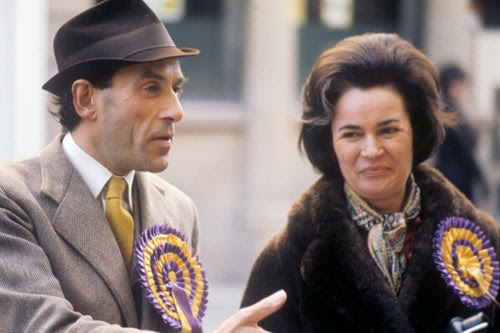
His double life was hugely risky, as it was illegal to be homosexual in Britain until 1967, and even after the law changed, Thorpe believed the truth being uncovered would put an instant end to his political career.
One man who he’d had an affair with long before taking over as leader of the Liberal party and the decriminalisation of homosexuality, was a man named Norman Scott...
Who is Norman Scott?
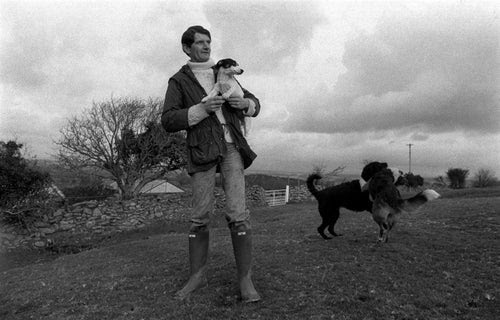
Norman Scott was an accomplished horseman and one-time model, who was working as a groom at the stables of the self-made son of a coalminer, Brecht Van de Vater, in the early 1960s.
During this time, Thorpe paid a visit to the stables and took a shine to him. He told Scott - then going by the name of Norman Josiffe - if he ever experienced problems with his employer to get in touch.
Months later, Scott left the stables after a row with Vater and suffered a mental breakdown, spending time in a psychiatric hospital for his severe depression.
Having been estranged from his family years prior, upon his release from hospital, Scott found himself penniless and homeless. He had also left Vater’s employment without a National Insurance Card, which he needed to be able to claim work and access to benefits. It was then he contacted Thorpe for help...
How did Jeremy and Norman’s affair begin?
According to Scott’s testimonial in court, after visiting Thorpe for assistance, he was taken to the house of his wealthy mother, Ursula, in Oxted. He claimed that during the night, Thorpe slipped into his room and the pair had sex for the first time.
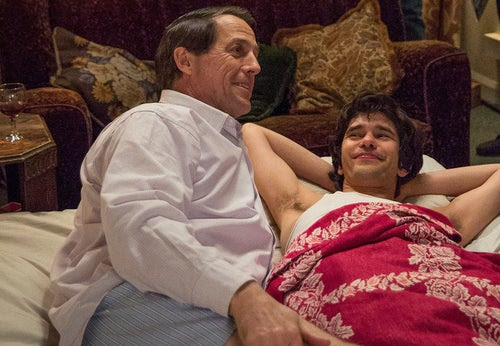
A relationship soon ensued, and Thorpe showered Scott with gifts, paid his rent and tried to help him find work. He also acted as his guardian in 1962 when he was questioned about the theft of a leather jacket from the psychiatric hospital he was treated at.
Thorpe soon assumed the role of his employer, but their relationship soured by later that year, with Scott claiming Thorpe had retained his replacement National Insurance Card. This remained an on-going source of tension between them.
Thorpe always maintained he and Scott did not have a relationship and he had never employed him, stating they had only ever been friends.
What happened to Scott after the affair?
Suffering another spell of depression, Scott confided in a friend he wanted to shoot the MP and commit suicide. This friend told the police, and Scott was forced to provide letters between him and Thorpe proving their affair. However, it was not enough for them to take any action.
He spent the ensuing years moving around, while finding it difficult to find stable employment thanks to the missing National Insurance Card. He blamed Thorpe for his troubles, regularly attempting to contact him for help.
He had, however, briefly married a woman in 1969, and fathered a son who he became estranged from.
Meanwhile, Thorpe had washed his hands of the affair, and enlisted fellow MP Peter Bessell to help sort the situation with Scott.
But with his regular demands, Scott remained a threat to Thorpe’s reputation.
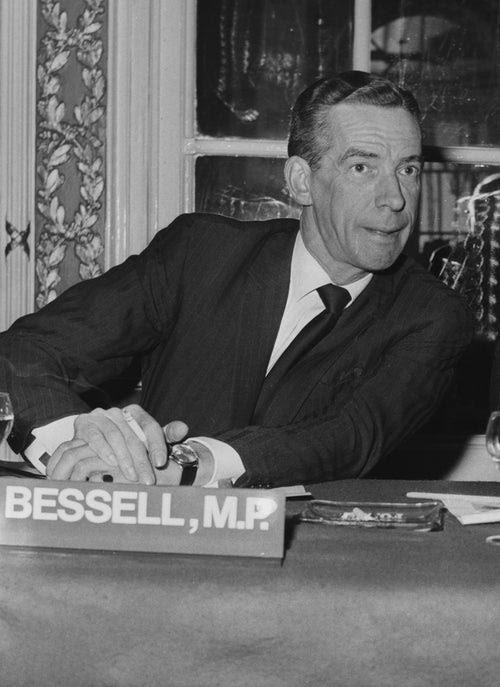
What is alleged to have happened next?
In the ensuing court case, the prosecution alleged that in 1969, Thorpe tried to persuade Bessell and friend David Holmes to kill Scott.
While initially they rejected the idea, years later, it is claimed Holmes began recruiting for a hit man, who was eventually found in the form of an airline pilot called Andrew Newton.
In October 1975, a plot was allegedly set up where Newton - calling himself Peter Keen - drove to Barnstaple and approached Scott telling him to get in his car as he had been hired to protect him from a suspected hit man.
What Newton hadn’t anticipated was that Scott would have his dog with him - an animal he was terrified of.

They stopped at a pre-determined point, but as Scott got out of the car, he was followed by his Great Dane, so Newton shot her. He then turned the gun on Scott, but the pistol failed several times and he rode off into the night.
Newton was later arrested after police found Scott, but insisted he had only ever been hired to intimidate Scott, although he did not reveal whose orders he was following. He was later convicted and sent to prison.
How did details of their affair come out?
While many newspapers knew of Thorpe’s liaisons with men, they were not able to publish the details, being wary of libel.
However, the claims about their relationship came to light when Scott appeared in a magistrates court on an unrelated minor social security fraud charge, where he stated he was being hounded over his and Thorpe’s romance.
As the claims were made in court - and therefore safe from libel laws - this meant newspapers were able to publish them, and the story became front page news.
Thorpe tried to quash the story by publishing what he claimed was a platonic letter he’d sent to Scott in 1962, but his use of his pet name “Bunnies” raised suspicion he was not telling the truth.
Under increasing pressure, Thorpe was forced to step down as leader of the Liberal party in May 1976. However, he still maintained they had not had a romantic relationship, explaining how he was quitting because of the damage the story had caused the party.
While press coverage died down, things blew up again when Newton was released from prison in October 1977 and he sold his story to the press, claiming he had been paid to kill Scott.
Thorpe, Holmes and two other men involved in hiring Newton were arrested and charged with conspiracy to murder. Thorpe was additionally charged with incitement to murder, due to his initial meetings in 1969 with Holmes and Bessell. The former MP maintained his innocence and vowed to clear his name when the case went to trial.
What happened at the trial?
The trial began at the Old Bailey on 8 May 1979 under Judge Joseph Cantley.
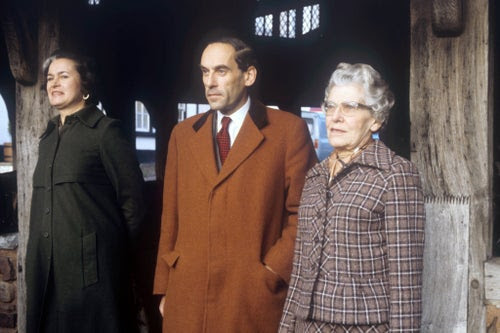
Thorpe, Holmes and one of the other two men did not testify in court, choosing to remain silent, believing the testimonies of Scott, Newton and Bessell did not make a good case for the prosecution.
Thorpe’s lawyer, George Carman, had also managed to paint the trio as untrustworthy and amoral, and in his closing speech, he suggested Holmes and others might have organised a conspiracy to kill Scott without Thorpe’s knowledge.
Over a month later on 20 June, the jury retired.
They returned to court after just two days, acquitting all four men of all charges, noting that Thorpe, a man of “hitherto unblemished reputation” and “a national figure with a very distinguished public record” could not be capable of the crime.
Judge Cantley also branded Scott a “crook, liar and parasite” following the verdict.
What happened to Thorpe after the trial?
Despite being found not guilty, Thorpe’s reputation was left in tatters after the trial and it never recovered. He did not return to politics, although he was appointed a director of Amnesty International in 1982, but staff protested and he withdrew from the position.
Shortly after, he first started showing signs of Parkinson’s Disease - a condition that gradually worsened over the ensuing years.
In 1999, after years away from public life, he published his memoirs, In My Own Time, in which he justified his silence at the trial and stated he never doubted the outcome.
Nine years later, he gave his first press interview in 25 years to The Guardian, where he said of the affair: “If it happened now I think the public would be kinder. Back then they were very troubled by it ... It offended their set of values.”
His health declined further declined, and he was cared for by his wife Marion until her death in March 2014.
Thorpe lived for a further nine months after her death, dying on 4 December 2014 at the age of 85.
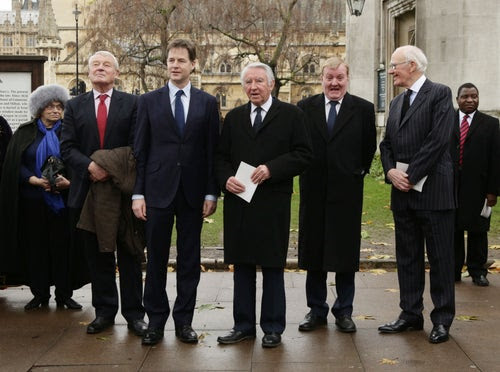
What happened to Scott after the trial?
Now 78, Norman Scott has been in a happy relationship for 20 years, and lives in a Devon farmhouse. He has always maintained Thorpe wanted him dead.
In an interview published in The Times last month, he said: “I think he should have gone to prison. And that also would have made my life so different, because people would have believed me.”
‘A Very English Scandal’ begins on Sunday 20 May at 9pm on BBC One.
Jeremy Thorpe scandal: Suspect might not be dead, police say
https://www.bbc.com/news/uk-
2 June 2018
A probe into a scandal involving former Liberal leader Jeremy Thorpe is to be revisited, after police admitted that a key suspect may still be alive.
A 2015 investigation into the alleged attempted murder of Mr Thorpe's lover - Norman Scott - was closed in 2017.
Gwent Police believed Andrew Newton - who claimed he was paid to kill Mr Scott - had died. But the force has now told the BBC this may not be the case.
Mr Scott said he thought police were continuing a "cover-up".
The revelations have been made in the BBC Four documentary The Jeremy Thorpe Scandal.
Following the BBC's revelations, the Mail on Sunday said it had tracked down Mr Newton - living under a different name - in Surrey.
The paper has published what it claims is a picture of Mr Newton, taken on Saturday. The man's face cannot be seen.
New information
Mr Thorpe, who died in 2014, was accused of hiring a hitman to murder Mr Scott but was acquitted at an Old Bailey trial in 1979.
The fresh investigation was launched by Gwent Police in 2015 after new claims emerged.
But the police's belief that Newton - who was convicted of shooting Mr Scott's dog in 1975 - had died, led the Crown Prosecution Service to close it last year.
Gwent Police told documentary makers enquiries made as part of the investigation had "indicated Newton was deceased".
But they added: "We have now revisited these enquiries and have identified information which indicates that Newton may still be alive."
The force said it planned to assess if Mr Newton "is able to assist the investigation".
When asked on Saturday night about the Mail on Sunday's claims to have tracked Mr Newton to Surrey, Gwent Police said it had "lines of inquiry open" but would not provide further comment "at this time".
What was the Jeremy Thorpe scandal?
What was the Jeremy Thorpe scandal?
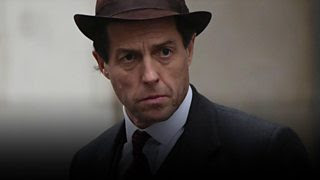
- Jeremy Thorpe was the MP for North Devon for 20 years, and leader of the Liberal Party between 1967-76. He died in 2014
- He was offered a cabinet post after the February 1974 election by then-Prime Minister Edward Heath
- In late 1960 or early 1961 he met Norman Scott, who worked for one of Mr Thorpe's friends in Oxfordshire. Mr Scott said the two were lovers, at a time when homosexuality was illegal
- Mr Scott spent years attempting to reveal the pair's relationship to the public, then claimed Mr Thorpe conspired with colleagues to have him assassinated
- In 1975, Andrew Newton shot Mr Scott's Great Dane, Rinka, on a rural road in Exmoor, but failed to kill Mr Scott after his gun jammed
- Newspapers began reporting Mr Scott's claims after he spoke about the relationship in court, meaning they were protected from libel laws
- Mr Thorpe resigned as leader of the Liberal Party in 1976 over the reports, but denied Mr Scott's allegations. He lost his seat in North Devon in 1979
- Mr Thorpe, along with three co-defendants, stood trial. Ex-Liberal MP Peter Bessell, and the failed assassin Newton, gave details of the alleged plot. A jury acquitted all four in 1979
BBC Panorama journalist Tom Mangold, who has investigated the case since the 1970s, said the 2015 investigation hinged on the story of a man he had met called Dennis Meighan.
Mr Meighan told the veteran reporter he was originally approached to carry out the murder - but he claims his police statement was later doctored to remove incriminating references to the Liberal Party and to Mr Thorpe.
Following Gwent Police's admission that Newton could still be alive, Mr Mangold insisted the investigation "must start again".
And reacting to the news, Mr Scott, 78, told the documentary: "I just don't think anyone's tried hard enough to look for him. I really don't.
"There must be people who knew him and there would surely be a record of him dying.
"I thought [Gwent Police] were doing something at last, and soon found out that absolutely they weren't, they were continuing the cover up as far as I can see."

The programme includes unearthed footage from a Panorama programme from 1979 that was never broadcast for legal reasons, after Mr Thorpe and his three co-defendants were acquitted of conspiracy to murder.
The director general at the time kept a master copy of the programme but ordered all other copies to be destroyed. But journalist Tom Mangold kept his copy of the report.
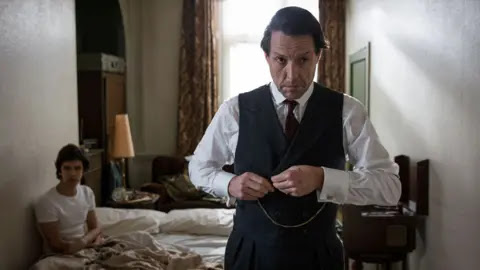
The programme will air after the end of the dramatisation A Very British Scandal, which stars Hugh Grant as Jeremy Thorpe and Ben Whishaw as Norman Scott.
A Very 'bone-chilling' English Scandal
Hugh Grant, politics and a murdered dog
Revealed: Letter that silenced Thorpe
Obituary: Jeremy Thorpe
How accurate is A Very English Scandal? What's the true story and who was Jeremy Thorpe? BBC1, BBC First | Radio Times
The real history behind A Very English Scandal and the Jeremy Thorpe affair
Hugh Grant and Ben Whishaw star in Russell T Davies' new show about the first British politician to stand trial for murder – but what is the truth behind the drama?
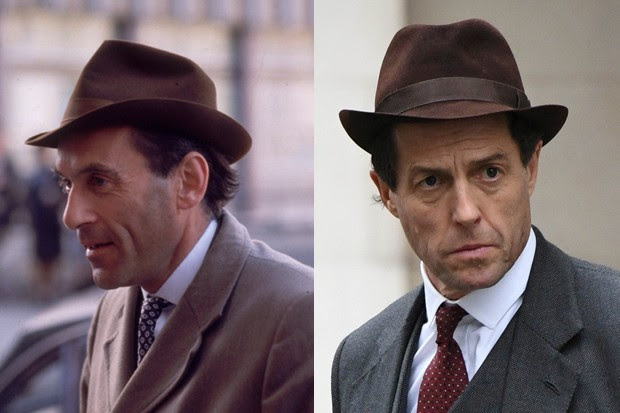
Russell T Davies's new drama A Very English Scandal is adapted from the "non-fiction novel" by John Preston and tells the true story of the 1970s Thorpe affair, in which former Liberal Party leader Jeremy Thorpe was accused of conspiring to murder his alleged former lover Norman Scott.
Who was Jeremy Thorpe MP?
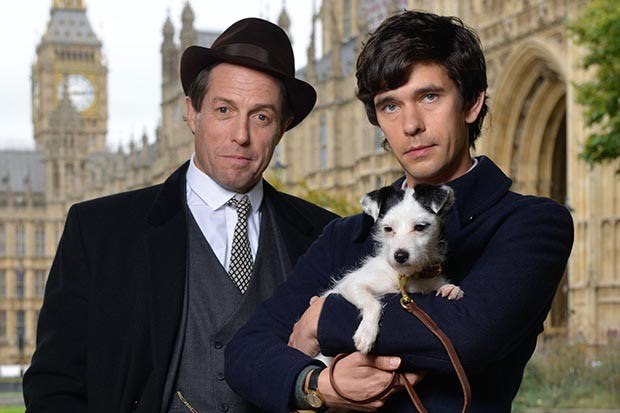
Jeremy Thorpe was the first British politician to stand trial for murder.
He was leader of the Liberal Party from 1967 until 1976, when revelations about a homosexual relationship with former model Norman Scott and an alleged murder plot came to light. He was tried and acquitted at the Old Bailey after one of the most notorious judgements in the court's history.
Born in 1929, he came from a line of Conservative MPs, but his political ideas aligned with the small and struggling Liberal Party and he set his sights on becoming a Liberal MP. After Eton and Oxford and a few years working in law and television, Thorpe was elected to Parliament for North Devon and became a rising star in the Party. Eight years later he had manoeuvred his way to the top and became the Leader.
Was Jeremy Thorpe homosexual?
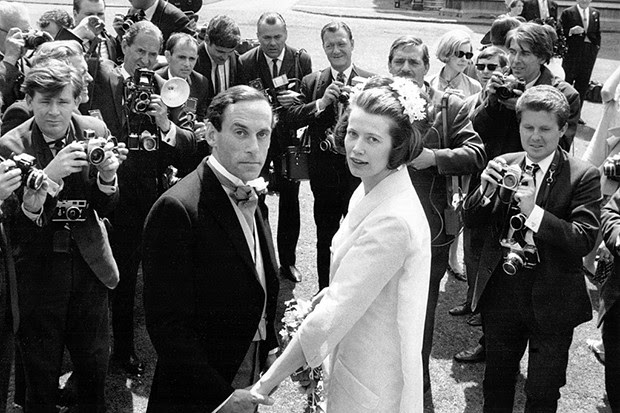
Thorpe had many relationships and liaisons with men, but this was a hugely risky secret life: all homosexual activity was illegal in the United Kingdom until 1967, and the truth about his sexuality would have instantly ended his political career.
More like this

Meet the cast of A Very Royal Scandal
He was married twice, first to Caroline and then – when she died in a car crash – to the formidable Marion. On his first wedding, he reportedly told his friend Bessell: "If it's the price I've got to pay to lead this old party, I'll pay it."
Long before he was married and before homosexual activity was decriminalised, Thorpe had a short-lived affair with a man named Norman Scott (then known as Norman Josiffe). This would haunt him for the rest of his career.
Who was Norman Scott and what was his relationship with Jeremy Thorpe?
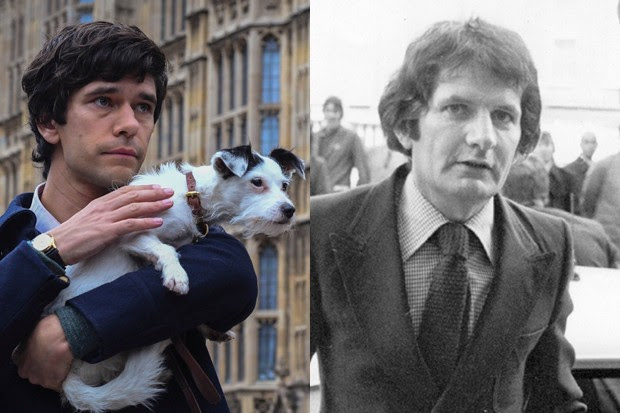
In 1961, Norman Scott had been suffering from severe depression and was fresh out of a psychiatric hospital. He was 21 and penniless, estranged from his mother, unknown to his father, and working as a groom at the stables of Brecht Van de Vater. It was while visiting his pal Vater that Jeremy Thorpe met Scott for the first time.
It was a chance encounter that would change the direction of his life.
Thorpe had urged Scott to get in touch if there were any problems with Vater as his employer, and sure enough, problems soon arose. Scott went to see his political friend in a state of great distress.
That same night he and his beloved Jack Russell Mrs Tish were taken to the house of Thorpe's wealthy mother Ursula. During the night, Thorpe slipped into Scott's room and – according to Scott's testimony – had sex with him for the first time. Thorpe nicknamed his new lover "Bunnies".
Scott had no money or prospects, but Thorpe paid his rent and bought him expensive new clothes and introduced him to friends. When the police questioned Scott about the alleged theft of a suede jacket from a fellow former patient of the psychiatric hospital, Thorpe insisted on acting as his guardian and seeing off the threat of legal action. But the relationship soon soured.
Why was Norman Scott a problem?
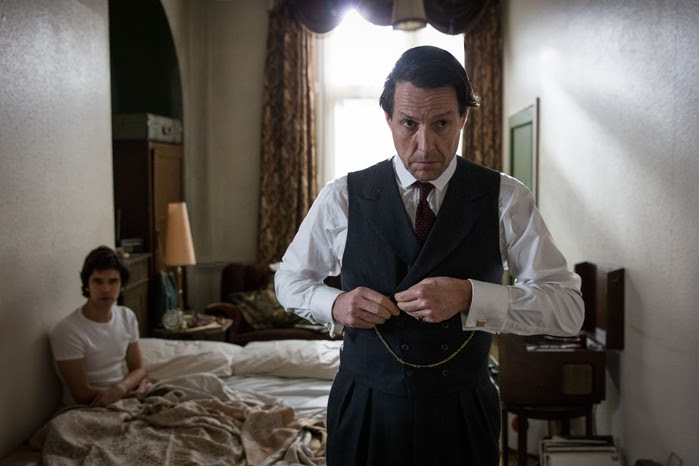
Over the next 15 years, Scott found employment here and there, moving around the country and trying out everything from modelling to monasteries. He had a disastrous and brief marriage, and fathered a son who he was barely allowed to see. He often lived in poverty, and went through periods of severe mental illness, attempting suicide.
Frequently he appealed for financial and practical help from Thorpe, who he blamed for his troubles: the MP had kept (and possibly lost) his National Insurance card, which was absolutely vital for him to get a job or benefits.
Thorpe washed his hands of the affair as much as possible, instead turning to his friend and admirer Peter Bessell MP to clean up his mess.
One particular mess came when Scott casually mentioned to Bessell that he'd lost his suitcase somewhere in Switzerland, containing several letters that Thorpe had written to him. The suitcase was hastily located and sent to the British Consulate in Zurich, where it was forwarded to Victoria station in London. Thorpe went along with Bessell's secretary Diana Stainton to collect it – with an ulterior motive: as she looked on in horror, he grabbed the case, forced open the locks and extracted the incriminating letters before sending it on to Scott in Dublin.
But the problem refused to disappear. Scott remained a threat to the politician's reputation – so Thorpe decided to do something about it.
What was Jeremy Thorpe alleged to have done?

"The higher he climbed on the political ladder, the greater was the threat to his ambition from Scott," the prosecution lawyer began at Thorpe's 1979 trial. "His anxiety became an obsession and his thoughts desperate."
The prosecution alleged that, early in 1969, Thorpe had invited his colleague Bessell and friend David Holmes to his room at the House of Commons, where he tried to persuade Holmes to kill Scott. Both men were pretty taken aback. For the next few years they humoured him, tried to dissuade him, and suggested alternatives. But the idea of murdering Scott never went away.
Bessell was having his own difficulties and left the country, but Holmes was finally convinced. He began a farcical attempt to recruit an assassin, enlisting the help of a dealer in carpets and a dealer in fruit machines. The men tracked down an airline pilot called Andrew Newton who, after 16 pints, agreed to kill Scott for £10,000. The money was funnelled away from the Liberal Party election funds.
Newton's nickname was "chicken-brains" and his initial plan, as he testified in court, was to attack his victim with a chisel hidden inside a bouquet of flowers. His eventual plan involved a gun – but didn't go any more smoothly.
In October 1975, pretending he'd been sent to protect Scott from a would-be killer, Newton persuaded him to get into his car. But Scott insisted on bringing along his giant Great Dane Rinka. Newton was terrified of dogs.
When Newton pulled over in the Exmoor fog and jumped out at a pre-determined spot, there was a complication: the excited hound apparently thought she was going for a walk and clambered out alongside Scott. So Newton shot her to death. He then turned the gun on Scott, but it did not go off and Scott scrambled away. (Newton later claimed he'd never intended to kill his victim, just to frighten him.)
The hapless gunman was caught and sent to prison for a couple of years for destruction of property (Rinka) and for intent to endanger life. Still, Scott's testimony about Jeremy Thorpe – and the ludicrous idea of a murder plot – was laughed out of court.
When – and how – was homosexuality legalised?
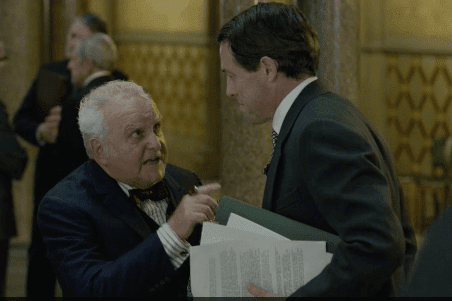
In 1957, the Wolfenden Report had recommended that "homosexual behaviour" between consenting adults in private should no longer be criminalised, but it was some time before Parliament was ready to consider the issue in earnest.
One politician who was determined to change the law was a Welsh Labour MP called Leo Abse. Unfortunately, despite his best attempts, in the early 1960s he was getting nowhere: the Lord Chancellor Lord Kilmuir refused to sit in any Cabinet meeting where the "filthy subject" would be discussed. What Abse needed was an ally in the Lords.
In 1965 he went to see the eighth Earl of Arran, known to friends as "Boofy". Lord Arran and his wife were utterly obsessed with badgers. At their home in Hemel Hempstead badgers were given the run of the place, so all humans were advised to wear gumboots and watch out for ringworm. But aside from badgers, he was also passionate about homosexual law reform – for undisclosed reasons.
It wasn't until later that Abse learned that Boofy's elder brother had been gay, and had killed himself.
The bill made steady progress through Parliament, but was sidelined when the Prime Minister called a general election; Abse and Arran persevered and managed to get it back on the table once a new government was formed. The Sexual offences Act was passed in 1967.
How did the Jeremy Thorpe affair come to light?

Up until this point, Thorpe had mainly kept rumours about his sexuality and his relationship with Scott under wraps, with the help of political colleagues, a compliant press, friends like Bessell, and the police. But in December 1975 the Private Eye and the Sunday Express caught on to a story from the local press about the mystery of the "dog in the fog".
As Preston writes, "in the tea rooms and corridors, people began to talk. And, as the gossip swirled, so did half-remembered rumours from years before."
The press started to dig, finding out that Thorpe's men had paid thousands to buy back potentially incriminating letters. Statements were made by Holmes and Bessell and Scott and Thorpe and the whole messy story began to emerge. Old letters between Thorpe and Scott were published in the newspapers, showing their once-affectionate relationship: "Bunnies can (and will) go to France," the MP wrote to his young lover. No one quite knew what it meant.
Thorpe was forced to resign his leadership of the Liberal Party in 1976. In 1978 he was arrested and charged, alongside Holmes and two other men: the carpet dealer and the fruit machine dealer who had allegedly conspired to find the hitman.
What happened at the Thorpe trial?
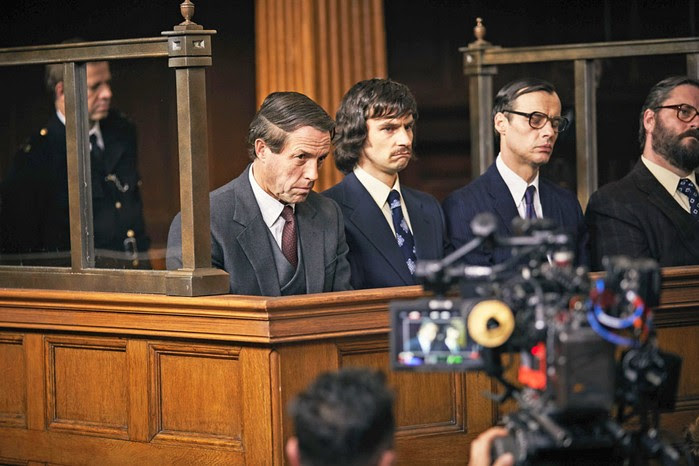
The choice of trial judge came as a surprise. The Honourable Sir Joseph Donaldson Cantley, as Preston explains, "was so little known outside legal circles that not a single news agency possessed a photograph of him. Hesitant of manner, fond of laughing at his own jokes and looking like a startled dormouse in his ermine robes, Cantley was not considered to be an intellectual heavyweight. He was also reckoned to be a crashing snob." Cantley was a gift to Thorpe.
Thorpe also benefitted from a talented lawyer, George Carman. In court he painted Bessell and Scott and Newton as hypocritical, untrustworthy and amoral liars – but his master stroke was to ban Thorpe from entering the witness box. This was a gamble: calling "no evidence" for Thorpe could make him look like he had something to hide. But it also saved him from facing questions from the prosecution that he may have found difficult to answer. It was a gamble that paid off.
And when it came to summing up, Cantley's extraordinary speech became so notorious that it inspired a Peter Cook sketch, Entirely A Matter For You.
"It is right for you to pause and consider whether it is likely that such persons would do the things these persons are said to have done," he told the jury. While the accused were of "hitherto unblemished reputation," Bessell was a "humbug" and Newton a "chump". As for Scott, he was "a hysterical, warped personality, accomplished sponger and very skilful at exciting and exploiting sympathy... he is a crook. He is a fraud. He is a sponger. He is a whiner. He is a parasite."
Unbelievably, he added: "But of course he could still be telling the truth... you must not think that because I am not concealing my opinion of Mr Scott I am suggesting that you should not believe him. That is not for me. I am not expressing any opinion."
Having not expressed any opinion whatsoever, and having warned the jury that they must be beyond all doubt that the witnesses were telling the truth, he called the case to a close.
The jury acquitted all four men on all charges.
What happened to Jeremy Thorpe after the trial?
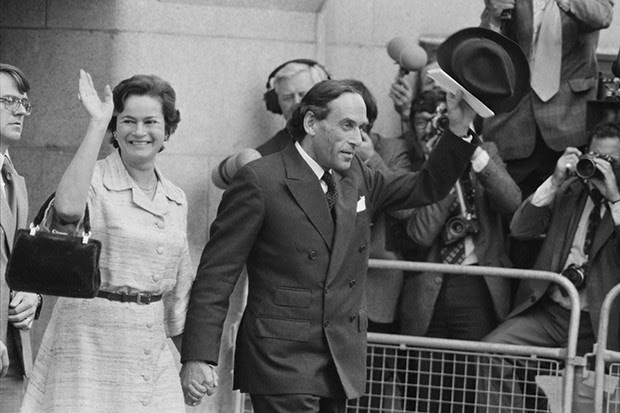
Thorpe's public reputation had been damaged irreparably. Preston writes: "Although he had been acquitted, Thorpe soon discovered that almost everyone thought he was guilty – and treated him accordingly."
He had already lost his seat in the May 1979 General Election before the trial began, and the fact that he turned down the chance to speak in court and give his own side of the story left many things unexplained. He was never able to return to public life: when he was chosen as Director of Amnesty International's British arm in 1982, there was such a public outcry that the job offer was retracted. His long-running campaign to secure himself a peerage also came to nothing.
Are Jeremy Thorpe and Norman Scott still alive?
In the mid 1980s Thorpe was diagnosed with Parkinson's Disease, which progressively robbed him of his power to communicate. He died in 2014 at the age of 85, outliving his ever-faithful wife Marion by just a few months.
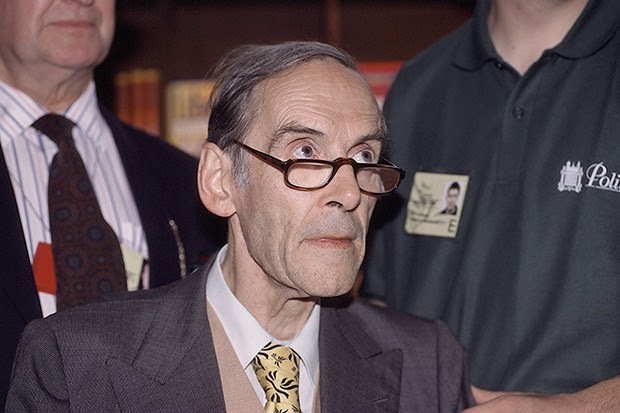
And what of Norman Scott, formerly Norman Josiffe? Now 78, he lives in an ancient farmhouse on Dartmoor in Devon alongside a collection of chickens, horses, and dogs, and has spent the last 20 years in a relationship with an artist. "I’ve got the most lovely life and have had for years," he recently told The Times. But does he think justice has been done? “Not at all.”
He told the newspaper: "I think he should have gone to prison. And that also would have made my life so different, because people would have believed me.”
Few of the other players in the story are still around. Peter Bessell had already been suffering from incurable emphysema at the time of the trial; he died in 1985, having lived his final days in Oceanside, California.
David Holmes was arrested in 1981 for "importuning for an immoral purpose" – that is, approaching men for sex – and exposed in the tabloids. His reputation also suffered because of the Thorpe case, and so he quit the financial and political world and instead became a manager of a roller-disco in Camden.
How accurate is A Very English Scandal?

The BBC drama has been adapted by Russell T Davies from the "non-fiction novel" A Very English Scandal by John Preston, which was published in 2016, with additional research by the production team. But Davies also left space for his imagination.
- For the latest news and expert tips on getting the best deals this year, take a look at our Black Friday 2021 and Cyber Monday 2021
"We did kind of re-research everything," Davies says. "The book had done an awful lot of research and had been published without John Preston being sued. At the BBC you have to re-prove everything, and go through that, and have two sources of evidence for everything.
"Also, at the same time, that's all very well, it's not a documentary – they get me in, I've got a good career as a writer, I have to say, ‘What am I being brought in for?’ And that's to imagine what those people said. And why they said it.
"That's an act of imagination, there's no proof in that, and that's what I'm actually good at. That's what I write about in my career, the madness of men."
This article was originally published on 3 June 2018
The Thorpe affair of the 1970s was a British political and sex scandal that ended the career of Jeremy Thorpe, the leader of the Liberal Party and Member of Parliament (MP) for North Devon. The scandal arose from allegations by Norman Josiffe (otherwise known as Norman Scott) that he and Thorpe had a homosexual relationship in the early 1960s, and that Thorpe had begun a badly planned conspiracy to murder Josiffe, who was threatening to expose their affair.
Thorpe on the trial
All three [principal prosecution witnesses] had ... been destroyed in cross-examination, and the prosecution's case at its close was shot through with lies, inaccuracies and admissions to such an extent that the defence decided not to give evidence. To have done so would have prolonged the trial unnecessarily.
Jeremy Thorpe, In My Own Time[14

Bessell's evidence against Thorpe, reported in the Daily Mirror during the pre-trial committal proceedings, November 1978
Obituary: Jeremy Thorpe - BBC News
https://www.bbc.com/news/uk-

James Landale looks back at the life of Jeremy Thorpe
Jeremy Thorpe, who has died aged 85 after a long battle with Parkinson's Disease, led the Liberal Party with flair and flamboyance.
His energetic campaigning and powerful oratory attracted many voters and he came close to achieving a share of government for his party.
Under his leadership, the Liberals looked to be regaining their position as a strong force in British politics.
But his political career ended when his life was engulfed in scandal and he faced trial on charges of conspiracy and incitement to murder.
John Jeremy Thorpe was born in Surrey on 29 April 1929.
He came from a Conservative family - both his father and grandfather were Tory MPs. One of his ancestors was parliamentary Speaker Thomas Thorpe, who was beheaded by a mob in 1461.
Election success
He was sent to a school in Connecticut in 1940 to escape the Blitz.
One historian has suggested that the liberal regime at his American school played a large part in formulating his political thinking and was, no doubt, a huge contrast to Eton where he went from 1943.
He read law at Trinity College, Oxford where he cut a dash, both by wearing Edwardian-style clothes and as a noted debater. He became chairman of the Liberal Club and then the Oxford Union.
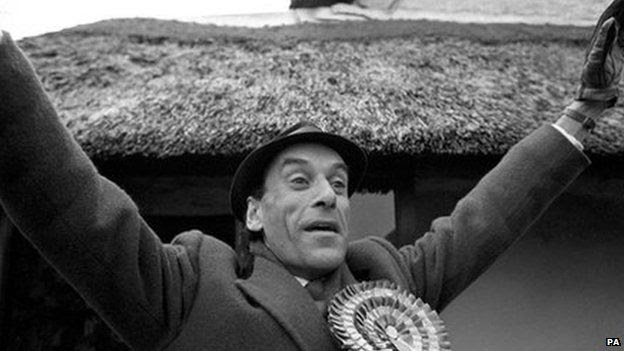
Image caption,
Acknowledging his supporters in the 1974 election
While training as a barrister he set out to find a parliamentary seat and was selected for Conservative-held North Devon, firmly in the west country Liberal heartland.
His energetic campaigning, and inspiring performances as an orator saw him halve the Conservative majority in the 1955 general election.
Just four years later, he won the seat by the narrowest of margins, a rare Liberal triumph in what had been a poor election showing for the party elsewhere in the country.
Conference favourite
He entered the 1960s as a pioneering campaigner for human rights, attacking South Africa's policy of apartheid and the post-colonial excesses in South East Asia.
He also achieved a reputation as something of a wit exemplified by his observation on Harold Macmillan's dismissal of a third of the Conservative cabinet in 1962.
"Greater love hath no man than this," quipped Thorpe, "that he lay down his friends for his life".
He became a favourite at Liberal party conferences and served as the party's treasurer before being elected leader in 1967 promising to turn the Liberals into a radical pioneering force.
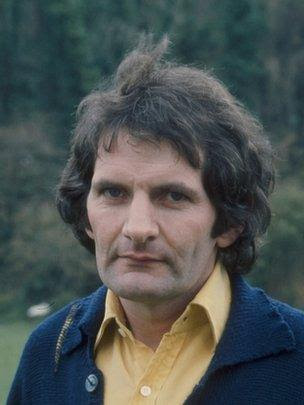
Norman Scott claimed a sexual relationship with Thorpe
Norman Scott claimed a sexual relationship with Thorpe
However Edward Heath's win in the 1970 general election dashed hopes of a Liberal revival and shortly after it Thorpe's young wife Caroline was killed in a car crash.
Three years later he married Marion Stein, a noted concert pianist and the divorced wife of the Queen's first cousin, the Earl of Harewood.
Helped by Thorpe's elegant appearance and charismatic style, the Liberals won 14 seats in the February 1974 election.
With a hung parliament, Conservative leader, Edward Heath, approached Thorpe to discuss a possible coalition.
Thorpe was attracted by the offer of a seat in Cabinet, but met opposition from his own MPs.
Denial
In the event, Harold Wilson's clear victory in the October 1974 election ended any hopes that the Liberals might have a share of power.
Within two years, stories were circulating about Thorpe's relationship with a former male model, Norman Scott.
It was made worse because the relationship was alleged to have started in 1961, when male homosexual acts were illegal.
The story broke when Scott was appearing at a court in Barnstaple on a minor social security charge.
During the hearing, Scott shouted out, "I am being hounded because of my sexual relationship with Jeremy Thorpe." He gave a statement to the police but no action was taken.
Trial
Thorpe issued an immediate denial but when an affectionate letter between them appeared in the press, Thorpe resigned as leader.
But worse was to come. Eighteen months later, a man called Andrew Newton was released from prison.
He had been jailed on charges arising from an incident on Exmoor in which Norman Scott's dog, Rinka, was shot.
He claimed that he had been paid by a leading Liberal supporter to kill Scott because of his blackmail threats but said he had lost his nerve and shot the dog instead.
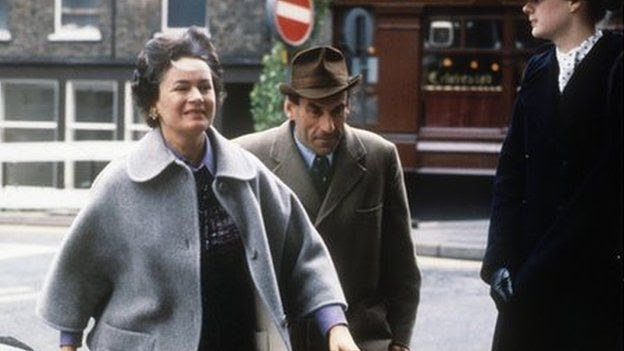
Arriving at the Old Bailey in 1979 with wife Marion
Nine more months of police investigation led to Thorpe and three associates being charged with conspiring to murder Scott.
The 1979 trial was postponed for eight days at Thorpe's request so that he could contest his North Devon seat in the May general election. He was heavily defeated.
The trial attracted reporters from all over the world. It took 20 days for the prosecution to present its case to the jury while defence evidence occupied just a single day.
Trial
Thorpe issued an immediate denial but when an affectionate letter between them appeared in the press, Thorpe resigned as leader.
But worse was to come. Eighteen months later, a man called Andrew Newton was released from prison.
He had been jailed on charges arising from an incident on Exmoor in which Norman Scott's dog, Rinka, was shot.
He claimed that he had been paid by a leading Liberal supporter to kill Scott because of his blackmail threats but said he had lost his nerve and shot the dog instead.

Arriving at the Old Bailey in 1979 with wife Marion
Arriving at the Old Bailey in 1979 with wife Marion
Nine more months of police investigation led to Thorpe and three associates being charged with conspiring to murder Scott.
The 1979 trial was postponed for eight days at Thorpe's request so that he could contest his North Devon seat in the May general election. He was heavily defeated.
The trial attracted reporters from all over the world. It took 20 days for the prosecution to present its case to the jury while defence evidence occupied just a single day.
Amnesty International
On the advice of his barrister, George Carman QC, Thorpe and his co-defendants elected not to go into the witness box.
Eventually, after six weeks, the charges were dismissed. For two years Jeremy Thorpe stayed out of the public eye.
But the affair resurfaced again when one of his co-defendants, David Holmes, a former deputy treasurer of the Liberal Party, wrote a series of articles for the News of the World newspaper.
In the first of them he claimed that Thorpe did incite him to murder Norman Scott. Thorpe's solicitor immediately issued a rebuttal and the director of public prosecutions said there was no question of another trial.
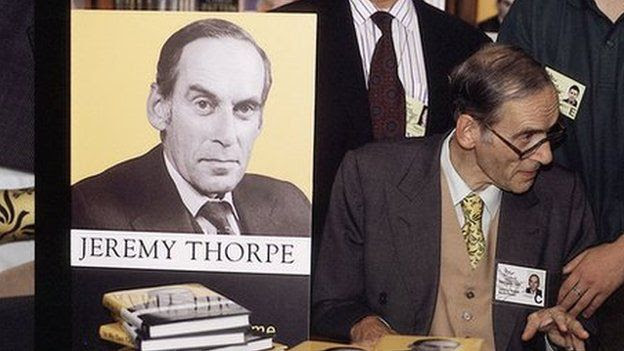
At a book signing in 1999
But Thorpe's public life was finished.
Shortly after his acquittal he was offered the post of director general of the British section of Amnesty International.
He had previously been a valuable source of information to the organisation, particularly on the subject of human rights abuses in Ghana.
But there was huge opposition from Amnesty's members and the appointment was never made.
His later years saw the onset of Parkinson's Disease. But he kept in close touch with the Westminster he loved, despite painful memories.
He became the President of the North Devon Liberal Association, later Liberal Democrat Association, and received a standing ovation when he appeared at the 1997 Liberal Democrat conference.
In an interview in 2009 the ailing former politician reflected on the events that had brought him down
"If it happened now," he said, " I think the public would be kinder."
Norman Josiffe
Norman Josiffe (born 12 February 1940), better known in the media as Norman Scott, is an English former dressage trainer[citation needed] and model who was a key figure in the Thorpe affair, a major British political scandal of the 1970s. The scandal revolved around the alleged plot by his ex-boyfriend, Liberal Party leader Jeremy Thorpe, to murder Scott after Scott threatened to reveal their sexual relationship to the media.
Early life, 1940–1960
Josiffe was born in Sidcup, Kent,[1] to Ena Dorothy Josiffe (née Lynch,[2] formerly Merritt,[3] 1907–1985), and Albert Norman Josiffe (1908–1983),[2][4] her second husband, who abandoned his wife and child soon after Norman's birth.[5] Educated at Bexleyheath, he later changed his surname to "Lianche-Josiffe" by amending his mother's maiden name, Lynch, and for a time called himself "the Hon Norman Lianche-Josiffe".[6][7]
Relationship with Jeremy Thorpe, murder attempt and trial, 1961–1979
In 1961, Josiffe was working as a groom for Brecht Van de Vater (born Norman Vivian Vater),[8] at Kingham Stables in Chipping Norton, Oxfordshire, when he met Jeremy Thorpe, MP, a friend of Vater. After Josiffe left his job at Vater's stables, he suffered from mental illness and spent some time in a psychiatric hospital. On 8 November 1961, a week after discharging himself from the Ashurst clinic in Oxford, he went to the House of Commons in London to see Thorpe. He was penniless, homeless and, worse, had left Vater's employment without his National Insurance card which, he believed he needed to obtain regular work and access to social and unemployment benefits. Thorpe promised he would help.[9] This was when the relationship between the two men was alleged to have started. Thorpe gave him the nickname "Bunnies"[10] but always denied any physical element in the relationship. When Thorpe took him to stay with his mother, Ursula Thorpe, Josiffe introduced himself as "Peter Johnson".[6] Josiffe's claims of mistreatment by Thorpe led to Josiffe being reported to the police, in the course of which the relationship was revealed.[11]
The relationship allegedly led indirectly to the 1975 attempted murder of Josiffe, who was by then calling himself Norman Scott.[12] His attacker, Andrew Newton, was arrested[13] after shooting dead Josiffe's dog, Rinka, but it was not until later that Josiffe's accusations against Thorpe became public.
Although the Sexual Offences Act 1967 had decriminalised homosexual acts in most of the UK, the resulting scandal lost Thorpe his popular support and he was forced to stand down as leader of the Liberal Party. In 1979, Scott testified at Thorpe's trial, whereat Thorpe and three others were acquitted of conspiracy to murder.
Personal life
On 13 May 1969,[14] after his relationship with Thorpe, Josiffe (now calling himself Scott) married Angela Mary Susan Myers (1945–1986), sister-in-law of the English comedy actor Terry-Thomas. Susan Scott was already two months pregnant at the time of their marriage and her family were not supportive of the marriage – her mother and sister refused to attend the ceremony and Captain Myers (Josiffe's new father-in-law) denounced Scott as homosexual at the wedding reception stating that the marriage "was doomed". The couple had a son – Diggory Benjamin W. Scott [15], who was born, later in 1969, in Spilsby, Lincolnshire.[11][16] Susan Scott left Scott in 1970, subsequently divorced, remarried in 1975 and died in 1986.
In 1971, while living in Tal-y-Bont in North Wales, where he found casual work, Scott met widow Gwen Parry-Jones, whose late husband had been a soldier in the Welsh Guards. She was a former local village postmistress and was an acquaintance of Liberal MP Emlyn Hooson. Parry-Jones arranged a meeting with Hooson, who interviewed Scott (with Liberal MP David Steel) about his relationship with Thorpe and started his own investigations, but could not substantiate the allegations. After the break-up with Scott, Parry-Jones became very depressed. In 1972, her aunt failed to get any response at her home for several weeks and the police discovered that she had died, which the coroner subsequently recorded as alcohol poisoning.[16]
In 1975, he began a relationship with a woman named Hilary Arthur, with whom, in May 1976, he had a daughter, Bryony.[17][18]
After 1979, Scott retreated into obscurity. At the time of Thorpe's death in 2014, he was living in Ireland,[12] but by the time of the 2018 dramatisation of his relationship with Thorpe, he had returned to the UK and was living again in Devon.[19]
In popular culture
In 2016, A Very English Scandal, by John Preston about the Thorpe scandal and subsequent trial was published.[20]
In 2018, a BBC miniseries also called A Very English Scandal was aired in which Scott was portrayed by Ben Whishaw.[21] Scott remarked to The Irish News: "I'm portrayed as this poor, mincing, little gay person ... I also come across as a weakling and I've never been a weakling."[22]
The mini-series' director, Stephen Frears, has described Scott as "erratic", stating that his reactions to both book and television series are inconsistent.[23] Andrew Rawnsley, reviewing Thorpe's biography by Michael Bloch, described both Thorpe and Josiffe as "liars" and "fantasists".[24]
References
Citation
- ^ General Register Office; United Kingdom; Birth Register Indexes; Reference: Volume 2a, p. 2064
- ^ Jump up to:a b General Register Office. England and Wales Civil Registration Indexes. London: General Register Office. Bromley, Q4
- ^ General Register Office. England and Wales Civil Registration Indexes. London: General Register Office. Dartford, Q2
- ^ General Register Office. England and Wales Civil Registration Indexes. London: General Register Office. Bromley, Q2
- ^ Simon Freeman with Barrie Penrose: Rinkagate: The Rise and Fall of Jeremy Thorpe. Bloomsbury, 1996. p. 37.
- ^ Jump up to:a b "Murder most Liberal". The Telegraph. 19 October 1996. Archived from the original on 18 December 2009. Retrieved 28 May 2018.
- ^ Leonard Downie, Jr. (3 June 1979). "Murder Conspiracy Trial Leaves Thorpe a Ruined Man". Washington Post. Retrieved 28 May 2018.
- ^ "Murder most Liberal". telegraph.co.uk. 18 October 1996. Archived from the original on 18 December 2009. Retrieved 9 July 2018.
- ^ Freeman and Penrose, pp. 40–43
- ^ "Who was Norman Scott and what was his relationship with Jeremy Thorpe?". Radio Times. Retrieved 28 May 2018.
- ^ Jump up to:a b Ash Percival (20 May 2018). "'A Very English Scandal': The Real Story Of Jeremy Thorpe, Norman Scott And The Alleged Murder Plot That Rocked British Politics". HuffPost. Retrieved 28 May 2018.
- ^ Jump up to:a b Gordon Rayner (4 December 2014). "Jeremy Thorpe scandal: where are they now?". The Telegraph. Retrieved 28 May 2018.
- ^ Preston, John (2016). A Very English Scandal. London: Viking. pp. 207–208. ISBN 978-0241215722.
- ^ General Register Office. England and Wales Civil Registration Indexes. London, England: General Register Office. Kensington, Q2
- ^ https://archive.spectator.co.uk/article/16th-december-1978/6/another-voice
- ^ Jump up to:a b "Did Norman Scott really get married and have a baby?". Radio Times. Retrieved 28 May 2018.
- ^ https://archive.spectator.co.uk/article/16th-december-1978/6/another-voice
- ^ Preston, John (5 May 2016). "Chapter 28". A Very English Scandal: Now a Major BBC Series Starring Hugh Grant. Penguin Books Limited. p. 518. ISBN 978-0-241-97375-2.
- ^ Helen Rumbelow (12 April 2018). "Jeremy Thorpe tried to kill me – Norman Scott on the scandal that shook Seventies Britain". The Times. Retrieved 3 June 2018.
- ^ Chris Mullin (9 May 2016). "A Very English Scandal review – Jeremy Thorpe's fall continues to fascinate". The Guardian. Retrieved 31 December 2019.
- ^ Emma Nolan (21 May 2018). "A Very English Scandal: Who was Norman Scott? Who was his wife?". The Express. Retrieved 28 May 2018.
- ^ "Norman Scott criticises 'weakling' portrayal in BBC's A Very English Scandal". The Irish News. 6 May 2018. Retrieved 28 May 2018.
- ^ Mark Brown (3 June 2018). "Stephen Frears queries reopening of Jeremy Thorpe investigation". The Guardian. Retrieved 31 December 2019.
- ^ Andrew Rawnsley (18 January 2015). "Jeremy Thorpe review – Michael Bloch's gripping and insightful biography". The Guardian. Retrieved 28 May 2018.
Sources
- Freeman, Simon; Penrose, Barrie (1997). Rinkagate: The Rise and Fall of Jeremy Thorpe. London: Bloomsbury Publications. ISBN 978-0-7475-3339-9.
Thorpe, while admitting that the two had been friends, denied any such relationship. With the help of political colleagues and a compliant press, he was able to ensure that rumours of misconduct went unreported for more than a decade. Scott's allegations were a persistent threat, however, and by the mid-1970s he was regarded as a danger both to Thorpe and to the Liberal Party, which was then enjoying a resurgence of popularity and was close to a place in government. Attempts to buy or frighten Scott into silence were unsuccessful, and the problem deepened, until the fallout following the shooting of his dog during a possible murder attempt by a hired gunman in October 1975 brought the matter into the open. After further newspaper revelations, Thorpe was forced to resign the Liberal leadership in May 1976, and subsequent police investigations led to him being charged, along with three others, with conspiracy to murder Scott. Before the case came to trial, Thorpe lost his parliamentary seat at the 1979 general election.
At the trial in May 1979, the prosecution's case depended heavily on the evidence of Scott, Thorpe's former parliamentary colleague Peter Bessell, and the hired gunman, Andrew Newton. None of these witnesses impressed the court. Bessell's credibility was undermined by the revelations of his financial arrangements with The Sunday Telegraph. In his summing-up the judge was scathing about the prosecution's evidence, and all four defendants were acquitted. Nevertheless, Thorpe's public reputation was damaged irreparably by the case. He had chosen not to testify at the trial, which left several matters unexplained amid public disquiet.
Thorpe's retirement into private life was followed by the onset of Parkinson's disease in the mid-1980s, and he made few public statements afterwards. He eventually achieved a reconciliation with the North Devon Liberal Democrat constituency party, of which he was honorary president from 1988 until his death in 2014. Allegations of suppression of evidence by the police before the trial were under investigation from 2015, culminating in June 2018 when the police said that there was no new evidence and the case would remain closed.
Background
Homosexuality and English law
editBefore the passage of the Sexual Offences Act 1967, which decriminalised most homosexual acts in England and Wales (but did not apply to Scotland or Northern Ireland), all sexual activity between men was illegal throughout the United Kingdom, and carried heavy criminal penalties. Antony Grey, a secretary of the Homosexual Law Reform Society, wrote of "a hideous aura of criminality and degeneracy and abnormality surrounding the matter".[1]
Political figures were particularly vulnerable to exposure; William Field, the Labour MP for Paddington North, was forced to resign his seat in 1953 after a conviction for soliciting in a public lavatory.[2] In the following year Lord Montagu of Beaulieu, the youngest peer in the House of Lords, was imprisoned for a year after being convicted of "gross indecency", victim of a virulent "drive against male vice" led by the Home Secretary, Sir David Maxwell Fyfe.[3]
Four years later public attitudes had changed little. When Ian Harvey, a junior Foreign Office minister in Harold Macmillan's government, was found guilty of indecent behaviour with a Coldstream Guardsman in November 1958, he lost both his ministerial job and his parliamentary seat at Harrow East. He was ostracised by the Conservative Party and by most of his former friends, and never again held a position in public life.[4] Thus, anyone entering politics at that time knew that revelations of homosexual activity would likely bring such a career to a swift end.[5]

Barnstaple, the main town in Thorpe's North Devon constituency
Thorpe
John Jeremy Thorpe was born in 1929, the son and grandson of Conservative MPs. He attended Eton, then studied law at Trinity College, Oxford, where, having decided on a political career, he devoted his main energies to making a personal impact rather than to his studies.[6] Rejecting his Conservative background, he joined the small, centrist Liberal Party—which by the late 1940s was a declining force in British politics, but still offered a national platform and a challenge to an ambitious young politician.[7] He became secretary and eventually President of the Oxford Liberal Club, and met many of the party's leading figures. In the Hilary term (January–March) of 1950–51 Thorpe served as President of the Oxford Union.[8]
John Jeremy Thorpe was born in 1929, the son and grandson of Conservative MPs. He attended Eton, then studied law at Trinity College, Oxford, where, having decided on a political career, he devoted his main energies to making a personal impact rather than to his studies.[6] Rejecting his Conservative background, he joined the small, centrist Liberal Party—which by the late 1940s was a declining force in British politics, but still offered a national platform and a challenge to an ambitious young politician.[7] He became secretary and eventually President of the Oxford Liberal Club, and met many of the party's leading figures. In the Hilary term (January–March) of 1950–51 Thorpe served as President of the Oxford Union.[8]
In 1952, while studying at the Inner Temple prior to his call to the bar, Thorpe was adopted as prospective Liberal parliamentary candidate for the North Devon constituency, a Conservative-held seat where, at the 1951 general election, the Liberals had finished in third place behind Labour.[9] Thorpe worked in the constituency tirelessly, using the slogan "A Vote for the Liberals is a Vote for Freedom", and at the 1955 general election, had halved the sitting Conservative MP James Lindsay's majority.[8] Four years later, in October 1959, he captured the seat with a majority of 362, one of six successful Liberals in what was generally an electoral triumph for the Conservative Macmillan government.[10][11]
The writer and former MP Matthew Parris described Thorpe as one of the more dashing among the new MPs elected in 1959.[12] Thorpe's chief political interest lay in the field of human rights, and his speeches criticising apartheid in South Africa attracted the attention of the South African Bureau of State Security (BOSS), who took note of this rising star in the Liberal Party.[8][13] Thorpe was briefly considered as best man at the 1960 wedding of his Eton contemporary Antony Armstrong-Jones to Princess Margaret, but was rejected when vetting checks indicated that he might have homosexual tendencies.[14][15][16] The security agency MI5, which routinely keeps records on all Members of Parliament, added this information to Thorpe's file.[5][17]
Josiffe, later named Scott
editNorman Josiffe was born in Sidcup, Kent, on 12 February 1940[18]—he did not assume the name Scott until 1967. His mother was Ena Josiffe, née Lynch; Albert Josiffe, her second husband, abandoned the family home soon after Norman's birth. Norman's early childhood was relatively happy and stable. After leaving school at 15 with no qualifications, he acquired a pony by means of an animal charity, and became a competent rider.[19][20] When he was 16 he was prosecuted for the theft of a saddle and some pony feed, and was put on probation. With the encouragement of his probation officer he took lessons at Westerham Riding School at Oxted in Surrey, and eventually found work at a stable in Altrincham in Cheshire. After moving there he chose to cut all links with his family, and began to call himself "Lianche-Josiffe" ("Lianche" being a stylised version of "Lynch"). He also hinted at an aristocratic background, and of family tragedies that had left him orphaned and alone.[21]
In 1959 Josiffe moved to the Kingham Stables in Chipping Norton, Oxfordshire, where he learned dressage while working as a groom. The stables were owned by Norman Vater, the self-made son of a coalminer who, like Josiffe, had inflated his name and was known as "Brecht Van de Vater". In the course of his rise, Vater had made numerous friends in higher social circles, among them Thorpe. Initially, Josiffe was settled and happy at the stables, but his relationship with Vater deteriorated in the face of the latter's assertive and demanding manner, and he was unable to form good relationships with his fellow-workers.[22] He began to evidence the kind of behaviour which a journalist would later summarise as his "extraordinary talent for wheedling his way into people's sympathy before turning their lives to misery with his hysterical temper-tantrums."[23]
Bessell
editPeter Bessell, eight years older than Thorpe, had a successful business career before entering Liberal politics in the 1950s.[24] He came to the party leadership's attention in 1955 when, as the Liberal candidate in the Torquay by-election, he substantially increased his party's vote in the first of a series of impressive Liberal results during the 1955–59 parliament.[25] He was subsequently selected as candidate for the more winnable constituency of Bodmin, and became both an admirer and personal friend of Thorpe, who in turn was impressed by Bessell's apparent business acumen.[26] At Bodmin in the 1959 general election, Bessell reduced the Conservative majority, and he followed this in the October 1964 election with victory by over 3,000 votes.[24] With the prestige of the letters "MP" after his name, Bessell set out in pursuit of serious money-making, while staying close to Thorpe whom he considered the likely next leader of the Liberal Party.[27]
Bessell noted that Thorpe, for all his gregariousness and warmth, appeared to have no female friends and lacked any interest in women. The former Liberal MP Frank Owen confided to Bessell his suspicions that Thorpe was homosexual; other West Country Liberals had formed the same opinion.[28] Aware that exposure as a gay man would end Thorpe's career, Bessell became his self-appointed protector, even to the extent, he later said, of falsely claiming to be bisexual, as a means of acquiring his friend's confidence.[29]
Holmes
editDavid Holmes, one of four assistant treasurers of the Liberal Party appointed by Thorpe in 1965, had been best man at Thorpe's wedding and was completely loyal to him.[30] He was godfather to Thorpe's son Rupert, born in 1969.[31] Holmes took over the role of Thorpe's protector after Bessell moved to the United States in January 1974.[32] When charged in 1978, he was described as David Malcolm Holmes (48), merchant banker, of Eaton Place, Belgravia.[33][34] He died in 1990, leaving a substantial fortune.[35]
Origins
editThorpe–Scott friendship
editIn late 1960 or early 1961, Thorpe visited Vater at the Kingham Stables, and briefly met Josiffe. He was sufficiently taken with the young man to suggest that, should Josiffe ever need help, he should call on him at the House of Commons.[21] Soon after this, Josiffe left the stables after a serious disagreement with Vater. He then suffered a mental breakdown, and for much of 1961 was under psychiatric care. On 8 November 1961, a week after discharging himself from the Ashurst clinic in Oxford, Josiffe went to the House of Commons to see Thorpe. He was penniless, homeless and, worse, had left Vater's employment without the National Insurance card which, at that time, was essential for obtaining regular work and access to social and unemployment benefits. Thorpe promised he would help.[36]
According to Josiffe's account, a homosexual liaison with Thorpe began that same evening, at the home of Thorpe's mother Ursula Thorpe (née Norton-Griffiths, 1903–1992) in Oxted and continued for several years.[37][38] Thorpe, while acknowledging that a friendship developed, denied any sexual dimension in the relationship.[39][n 1] Thorpe organised accommodation for Josiffe in London, and a longer-term stay with a family in Barnstaple, in the North Devon constituency. He paid for advertisements in Country Life magazine, in an effort to find work with horses for his friend,[40] arranged various temporary jobs, and promised to help Josiffe to realise an ambition to study dressage in France. On the basis of Josiffe's claim that his father had died in an air crash, Thorpe's solicitors investigated whether any money was due, but found that Albert Josiffe was alive and well in Orpington.[41]
When, early in 1962, the police questioned Josiffe about the alleged theft of a suede jacket, Thorpe persuaded the investigating officer that Josiffe was recovering from mental illness, and was under his care. No further action was taken.[37][42] In April 1962 Josiffe obtained a replacement National Insurance card which, he later said, was retained by Thorpe who had assumed the role of his employer. This was denied by Thorpe, and the "missing card" remained an ongoing source of grievance for Josiffe.[43] He began to feel marginalised by Thorpe, and in December 1962, in a fit of depression, confided to a friend his intention to shoot the MP and commit suicide. The friend alerted the police, to whom Josiffe gave a detailed statement of his sexual relations with Thorpe, and produced letters to support his story.[44] None of this evidence impressed the police sufficiently for them to take action, although a report on the matter was added to Thorpe's MI5 file.[44]
In 1963, a relatively calm period in Josiffe's life as a riding instructor in Northern Ireland ended after he was seriously hurt in an accident at the Dublin Horse Show.[45] He moved back to England, and eventually found a job at a riding school in Wolverhampton, where he stayed for several months before his erratic behaviour proved too much, and he was asked to leave.[46] After a period of aimlessness in London, Josiffe saw an advertisement for a groom's post in Porrentruy in Switzerland. Thorpe used his influence to secure him the job. Josiffe left for Switzerland in December 1964, but returned to England almost immediately with complaints that conditions were impossible. In his hurry to depart he left his suitcase behind, which contained letters and other documents that, he believed, supported his claims to a sexual relationship with Thorpe.[47]
Threats and counter-measures
Thorpe proved to be a lively and witty performer in the cut and thrust of parliamentary debates, and his presence in the House of Commons was soon noticed. In July 1962, in the wake of some disastrous Conservative by-election performances, Macmillan sacked seven cabinet ministers in what was known as the "Night of the Long Knives". Thorpe's comment—"Greater love hath no man than this, that he lay down his friends for his life"—was widely regarded in the press as the most apt verdict on the prime minister.[13] Thorpe raised his political profile with effective attacks on government bureaucracy, and in the October 1964 general election was returned in North Devon with an increased majority.[48] A year later he secured the office of Liberal Party treasurer, a significant step towards his ambition to become the next party leader.[49]
By early 1965 Josiffe was in Dublin, where he worked at various horse-related jobs while continuing to harass Thorpe by letter about his missing luggage and the continuing National Insurance card issue.[50] Thorpe rejected any responsibility for these matters.[51] In mid-March 1965 Josiffe wrote a long letter to Thorpe's mother, which began: "For the last five years, as you probably know, Jeremy and I have had a homosexual relationship." The letter blamed Thorpe for awakening "this vice that lies latent in every man", and accused him of callousness and disloyalty.[52] Ursula Thorpe gave the letter to her son, who drafted a quasi-legal statement rejecting the "damaging and groundless accusations" and accusing Josiffe of attempting to blackmail him. The document was never sent; instead, Thorpe turned to Bessell for advice.[53]
Bessell, anxious to be of service to his party's highest-profile figure, flew to Dublin in April 1965. He found that Josiffe was being advised by a sympathetic Jesuit priest, Father Sweetman,[54] who believed that at least some of Josiffe's allegations might be true; otherwise, he asked Bessell, why had he flown all the way from London to deal with them?[55] Bessell warned Josiffe of the consequences of attempting to blackmail a public figure, but in a more conciliatory vein promised to help recover the missing luggage and insurance card. He also hinted at the possibility of an equestrian job in America.[54] Bessell's intervention appeared to contain the problem, particularly as Josiffe's suitcase was recovered shortly afterwards—although letters implicating Thorpe had been removed.[56] For most of the following two years Josiffe remained largely quiescent in Ireland, attempting to establish himself in various careers; part of this time was spent in a monastery. It was during this period that he formally adopted the name of Scott.[57][n 2]
In April 1967 Scott wrote to Bessell from Ireland, asking for help in obtaining a passport in his changed name so that he could begin a new life in America.[57] A second, less positive letter, dated July, indicated that Scott had returned to England and was once again in difficulties, with medical bills and other debts. His lack of an insurance card prevented him from claiming benefits.[59] By this time, Thorpe had succeeded Jo Grimond as leader of the Liberal Party.[60][n 3] To resolve Scott's immediate problems, and to prevent a resumption of his tirades against the new party leader, Bessell began paying him a "retainer" of between £5 and £10 a week, ostensibly in lieu of lost national insurance benefits.[61] Bessell also arranged Scott's new passport, but by this time Scott had abandoned his American plans and wished to establish a career as a model. He asked Bessell for £200 to set him up; Bessell refused, but in May 1968 gave him £75, on the understanding there would be no further demands for a year.[62]
Developments
editIncitement
editThorpe's leadership of the Liberals was not, initially, an unqualified success; his local campaigning skills did not readily transfer to set speeches on national or international issues, and some sections of the party became restless.[63] His engagement to Caroline Allpass, announced in April 1968, reassured those in the party who had reservations about his private life; others were shocked by Thorpe's emphasis on the political motivation for the marriage—worth five points in the polls, he opined to Mike Steele, the party's press officer.[64] For much of 1968 Thorpe was untroubled by Scott, who had acquired new friends and, according to Bessell, had burned his Thorpe letters.[65] His reappearance in November 1968, again penniless and without prospect of work, was particularly unwelcome to Thorpe, as he fought to establish his leadership credentials. Bessell provided immediate relief by resuming the weekly cash retainer, but this was a short-term respite.[30]
Early in December 1968 Bessell was summoned to Thorpe's office in the House of Commons. According to Bessell, Thorpe said of Scott: "We've got to get rid of him", and later: "It is no worse than shooting a sick dog."[66] Bessell said later that he was unsure whether Thorpe was serious, but decided to play along, by discussing various ways of getting rid of Scott's body. Thorpe supposedly thought that disposal down one of Cornwall's many disused tin mines offered the best option, and also suggested his friend David Holmes as an appropriate assassin.[30]
Bessell further maintained that in January 1969 Thorpe called him to a meeting together with Holmes, and that again Thorpe put forward suggestions for eliminating Scott. These were dismissed as impractical or ridiculous by Bessell and Holmes, who nevertheless agreed to give the matter further consideration. They hoped, said Bessell, that if they stalled, Thorpe would see the absurdity of his murder scheme and abandon it. Holmes, who largely confirmed Bessell's account of the meeting, later justified this decision on the grounds that "if we had simply said no, he might have gone elsewhere—and that might have led to an even greater disaster."[30] According to Bessell and Holmes, discussions of the plan ended in May 1969, after the surprising news of Scott's wedding that month.[66]
Party enquiry
By early 1971, Thorpe's political career had stalled. He had led the party to a disastrous performance in the general election of June 1970; in an unexpected victory for the Conservatives under Edward Heath, the Liberals lost seven of their thirteen parliamentary seats, and Thorpe's majority in North Devon fell to below 400.[67] Bessell, with mounting business worries, did not stand for re-election in Bodmin.[24] Thorpe faced censure for his conduct of a campaign during which he had spent extravagantly and left the party on the verge of bankruptcy; but the matter was put aside in a wave of sympathy when his wife Caroline was killed in a road accident 11 days after the election. Thorpe was devastated; he continued as leader, but for the next year performed little beyond routine party duties.[67]

The village of Tal-y-bont, North Wales, where Scott lived in 1971
Meanwhile, Bessell's efforts ensured that for the time being the Scott threat was kept at bay. The missing insurance card meant that Scott's wife, who was pregnant, could not claim maternity benefits. Scott threatened to talk to newspapers, but the matter was resolved by the issue of an emergency card after Bessell's intervention at the Department of Health and Social Security.[68] In 1970 Scott's marriage collapsed; he blamed Thorpe, and again threatened exposure.[69] Bessell successfully prevented Thorpe's name being mentioned in court during the divorce proceedings, and arranged that Thorpe would anonymously pay the legal costs.[70][71] Early in 1971 Scott moved to a cottage in the village of Tal-y-bont in North Wales, where he befriended a widow, Gwen Parry-Jones. He sufficiently persuaded her of his mistreatment at the hands of Thorpe that she contacted the Liberal MP for the adjoining constituency of Montgomeryshire—Emlyn Hooson, on the right wing of the party and a friend of neither Thorpe nor Bessell. Hooson suggested a meeting at the House of Commons.[72]
On 26 and 27 May 1971 Scott told his story to Hooson and David Steel, the Liberals' chief whip. Neither was fully convinced, but felt the matter warranted further investigation. Against Thorpe's wishes, a confidential party enquiry was arranged for 9 June, to be chaired by Lord Byers, the leader of the Liberals in the House of Lords. At the enquiry Byers took a tough line against Scott, failing to offer him a chair and treating him, Scott said, "like a boy at school up before the headmaster."[73] Byers's unsympathetic manner quickly unsettled Scott, who changed the details of his story several times and frequently broke down in tears. Byers suggested that Scott was a common blackmailer who needed psychiatric help. Declaring that Byers was a "pontificating old sod", Scott fled the room.[66] The enquiry then questioned police officers about letters which Scott had shown to the police in 1962, but were told that these were inconclusive.[74] Thorpe persuaded the Home Secretary, Reginald Maudling, and the Metropolitan Police Commissioner, John Waldron, to inform Byers that there was no police interest in Thorpe's activities, and no evidence of wrongdoing on his part.[75] As a result, the enquiry dismissed Scott's allegations.[66]
Further threats
Angry at his treatment by the Byers inquiry, Scott sought other means of pursuing his vendetta against Thorpe. In June 1971 he met Gordon Winter, a South African journalist who was also an agent for the South African intelligence agency BOSS. Scott provided details of his supposed seduction by Thorpe, a story which Winter assured his BOSS masters would destroy Thorpe and the Liberal Party. He found that no newspaper would print the story on largely uncorroborated and unreliable evidence.[76] In March 1972 Scott's friend Gwen Parry-Jones died; Scott used the inquest to denounce Thorpe for ruining his life and driving Parry-Jones to her death. None of these accusations were published.[77] Depressed, Scott retreated into a state of torpor, assisted by tranquillisers, and for a while presented no threat to Thorpe.[78]
In 1972 and 1973 Thorpe's political fortunes, and those of the Liberals, revived. Thorpe's personal standing was enhanced when, on 14 March 1973, he married Marion, Countess of Harewood, whose former husband was a first cousin to the Queen.[80] After a series of by-election victories and local government gains, an electoral breakthrough for the party looked plausible when Heath called a general election in February 1974. In that election, with more than six million votes (19.3% of those cast), the Liberals achieved by far their best election result since the Second World War,[81] but under the first-past-the-post voting system this large vote translated into only 14 seats. As neither major party won an overall majority, these seats gave Thorpe (whose personal majority in North Devon increased to 11,072)[82] significant leverage.[83] He was briefly in coalition discussions with Heath, who was prepared to give cabinet posts to Thorpe and other senior Liberals. Thorpe later denied that there was any serious prospect of agreement,[84] and in March 1974 Harold Wilson formed a minority Labour government. In the second 1974 general election, in October, Wilson achieved a narrow majority; the Liberals lost ground, with 5.3 million votes and 13 MPs.[83][n 4]
After Parry-Jones's death Scott lived quietly for a while in the West Country.[86] In January 1974 he met Tim Keigwin, Thorpe's Conservative opponent in North Devon, and gave his version of his relationship with Thorpe. Keigwin was advised by the Conservative leadership that the material should not be used.[87] Scott also confided in his doctor, Ronald Gleadle, who was treating him for depression. He had shown Gleadle his dossier of documents; the doctor, without Scott's knowledge or consent, sold the papers to Holmes, who had assumed the role of Thorpe's protector after Bessell settled permanently in California in January 1974. Holmes paid £2,500 for the documents, which were promptly burned in the home of Thorpe's solicitor.[32] A further cache of papers was discovered in November 1974, by builders renovating a London office formerly used by Bessell. They found a briefcase containing letters and photographs that apparently compromised Thorpe, among them Scott's 1965 letter to Ursula Thorpe. Undecided what to do with their find, they took it to the Sunday Mirror newspaper. Sidney Jacobson, the paper's deputy chairman, decided not to publish the material and passed the briefcase and its content to Thorpe.[80] Copies of the documents were kept in the newspaper's files.[88]
Alleged conspiracy
In their analysis of the case, the journalists Simon Freeman and Barry Penrose state that Thorpe probably formed the outline of a plan to silence Scott early in 1974, after the latter's re-emergence became a matter of increasing concern.[89] Holmes later said that Thorpe was insistent that Scott be killed: "[Jeremy felt] he would never be safe with that man around".[90] Uncertain how to proceed, late in 1974 Holmes approached a business acquaintance, a carpet salesman named John Le Mesurier (not to be confused with the actor of that name). Le Mesurier introduced Holmes to George Deakin, a fruit machine salesman who, he thought, would have contacts with people who might be prepared to deal with Scott. Holmes and Le Mesurier concocted a story involving a blackmailer who needed to be frightened off; Deakin agreed to help.[91] In February 1975 Deakin met Andrew Newton, an airline pilot, who said he was willing to deal with Scott for an appropriate fee—between £5,000 and £10,000 was suggested.[92] Deakin put Newton in touch with Holmes. Newton always said that he had been hired to kill, not frighten, citing the size of the fee that he was offered—too much, he said, simply to scare someone.[93]
While these arrangements proceeded, Thorpe wrote to Sir Jack Hayward, the Bahamas-based millionaire businessman, who had given generously to the Liberal Party in the past. In the wake of the Liberals' February 1974 election successes, Thorpe asked for £50,000 to replenish the party's funds. He further requested that £10,000 of this sum be paid, not into the party's regular accounts but to Nadir Dinshaw, an acquaintance of Thorpe's who was resident in the Channel Islands. Thorpe explained that this subterfuge was necessary to deal with a special category of unspecific election expenses. Hayward trusted Thorpe, and sent the £10,000 to Dinshaw who, instructed by Thorpe, passed the money to Holmes.[89] After the October 1974 election Thorpe again requested funds from Hayward, and again asked that £10,000 be sent via the Dinshaw route. Hayward obliged, though this time with more reluctance and after some delay. No accounting of this £20,000 was ever provided; Holmes, Le Mesurier and Deakin all said that it was used to finance a "conspiracy to frighten", although they disagreed as to how much was spent.[93] Thorpe later changed the story he had given Hayward about special categories of election expenses, and said he had deposited the sum with accountants "as an iron reserve against any shortage of funds at any subsequent election." He denied that he had authorised any payment to Newton or to anyone else connected with the case.[94]
Shooting
Newton met Holmes early in October 1975 when, according to Newton, Holmes was given a down payment on a fee of £10,000. Holmes later denied any such transaction, admitting only an agreement that Newton would carry out a frightening operation.[93] On 12 October Newton, calling himself "Peter Keene", drove to Barnstaple in a yellow Mazda car where he approached Scott, claiming to have been hired to protect Scott from a supposed Canadian hit man.[95] This seemed plausible to Scott, who had been beaten up a few weeks earlier,[96] and he agreed to meet "Keene" at a later date. He was sufficiently cautious to ask a friend to make a note of the stranger's car registration number.[97]
On 24 October Newton, now driving a Ford saloon, met Scott by arrangement in Combe Martin, just north of Barnstaple. Newton explained that he had to drive to Porlock, about 25 miles (40 km) away, and suggested that Scott accompany him—he and Scott could talk on the journey. Scott had with him his recently acquired pet dog, a Great Dane called Rinka; this disconcerted Newton, who was afraid of dogs, but Scott insisted that Rinka go with them. At Porlock, Newton left Scott and Rinka at a hotel while he supposedly dealt with his business. He picked them up shortly after 8 pm, and they began the drive back to Combe Martin.[98] On a deserted stretch of road, Newton began to drive erratically, feigning tiredness, and accepted Scott's suggestion that he take over the driving. They stopped; Scott got out, followed by Rinka, and ran round to the driver's side, where he found Newton, gun in hand. Newton shot the dog in the head and, saying "It's your turn now", pointed the gun at Scott. The pistol failed to fire several times; eventually Newton jumped into the car and drove away, leaving Scott and the dead or dying dog by the roadside.[99][100]
After Scott had been picked up in a distressed state by a passing car, the police were notified, and began enquiries. Newton was quickly identified through the Mazda's registration number, and arrested; his story was that Scott was blackmailing him and that the shooting had been intended to frighten him.[101] He made no mention of any deal with Holmes, perhaps calculating that by keeping silent he would maximise his chances of payment from that quarter.[99][102]
Revelations
On 12 December 1975 Private Eye included another short teasing piece by Auberon Waugh which ended: "My only hope is that sorrow over his friend's dog will not cause Mr Thorpe's premature retirement from public life".[103] By this time most newspapers knew of the stories surrounding Thorpe and Scott, but were wary of libel; according to Parris, by keeping silent they were "serving notice on Thorpe that they knew a bigger story must break, and could wait for it".[92] In January 1976 Scott appeared before magistrates on a minor social security fraud charge, and stated that he was being hounded because of his previous sexual relationship with Thorpe.[104] This claim, made in court and therefore protected from the libel laws, was widely reported.[105]
The Daily Mail had meanwhile discovered Bessell's whereabouts in California, and on 3 February 1976 carried a long interview with the former MP. Bessell's claim that he had been blackmailed by Scott provided Thorpe with temporary cover.[106] On 6 March newspapers reported Holmes's purchase of Scott's dossier from Gleadle, and a few days later David Steel discovered from Dinshaw, a personal friend, that £20,000 intended for the party had been diverted to Holmes and was unaccounted for. Steel told Thorpe that he should resign, but he refused.[104][107] In an attempt to reassure his wavering parliamentary colleagues, on 14 March Thorpe made arrangements with The Sunday Times newspaper to publish a detailed rebuttal of Scott's charges, under the heading "The Lies of Norman Scott".[108]
Auberon Waugh on Thorpe's election victory, February 1974
The most disappointing result has been Jeremy Thorpe's success in North Devon. Thorpe was already conceited enough, and now threatens to become one of the great embarrassments of politics. Soon I may have to reveal some of the things in my file on this revolting man.
Private Eye, March 1974.[79]
The "Bunnies" letter, February 1962
"Since my letters normally go to the House, yours arrived all by itself at my breakfast table at the Reform, and gave me tremendous pleasure. I cannot tell you just how happy I am to feel that you are really settling down ... you can always feel that whatever happens Jimmy and Mary are right behind you ... no more bloody clinics ... In haste. Bunnies can (and will) go to France. I miss you"
Extracts from a letter from Thorpe to Josiffe, February 1962.[4


The moorland road above Porlock Hill, close to the scene of the shooting
Newton's trial took place at Exeter Crown Court from 16 to 19 March 1976, where Scott repeated his allegations against Thorpe despite the efforts of the prosecution's lawyers to steer him away. Newton was found guilty of possessing a firearm with intent to endanger life, and sentenced to two years' imprisonment, but he did not incriminate Thorpe.[109][n 5] Thorpe's difficulties increased when Bessell, fearing for his own position and perhaps scenting the possibility of making money, changed his stance and confessed in the Daily Mail on 6 May that he had lied to protect his former friend.[104] A further concern for Thorpe was the danger that newspapers would publish letters he had sent to Scott early in their friendship. In an effort to forestall this, Thorpe arranged for the publication of two of the letters in The Sunday Times, a paper generally sympathetic towards him. In one of these letters Thorpe referred to Scott by the pet name "Bunnies". The tone of this letter convinced readers and commentators that Thorpe had not been frank about the nature of the relationship. On 10 May 1976 he resigned as Liberal leader amid rising criticism, again categorically denying Scott's allegations but acknowledging the damage that they were inflicting on the party.[111]
After Thorpe's resignation the relative lack of press attention to the story for 18 months disguised the extent to which investigative reporting continued. Barry Penrose and Roger Courtiour, collectively known as "Pencourt", had originally been hired by Wilson after his retirement, to investigate the former prime minister's theory that Thorpe was a target of South African intelligence agencies.[112] Pencourt's investigations led them to Bessell, who gave them his account of a conspiracy to murder Scott, and Thorpe's role in it.[113] Before they could publish, they were scooped; Newton, released from prison in October 1977, sold his story to the London Evening News. He said that he had been paid £5,000 to kill Scott, and provided photographs of him receiving payment from Le Mesurier.[114][115][n 6] A lengthy police inquiry followed, at the end of which Thorpe, Holmes, Le Mesurier and Deakin were charged with conspiracy to murder. Thorpe was additionally charged with incitement to murder, on the basis of his 1969 meetings with Bessell and Holmes. After being released on bail, Thorpe declared: "I am totally innocent of this charge and will vigorously challenge it".[118]
On 2 August 1978 Thorpe participated in a House of Commons debate about the future of Rhodesia,[119] but thereafter played no further active part in parliament, although he remained North Devon's member. At the Liberals' 1978 annual assembly in Southport, he embarrassed the leadership by making a theatrical entrance and taking his place on the platform.[120]
Committal and trial
The prosecution set out its case at the pre-trial committal hearing, which began in Minehead on 20 November 1978. At the request of Deakin's counsel, reporting restrictions were lifted, which meant that newspapers were free to print anything said in court without fear of the libel laws.[121] This move infuriated Thorpe, who had hoped for an in camera hearing which would avoid unfortunate newspaper headlines and perhaps lead to the dismissal of the case. Whatever the outcome, Thorpe knew that the adverse publicity would destroy his career, and that Scott would thus have his revenge.[122] As the hearings began, Bessell described the 1969 meetings where he alleged that Thorpe had suggested that Holmes should kill Scott, including the comment about the shooting of a sick dog.[123] The court learned that Bessell had a contract with The Sunday Telegraph, which was paying him £50,000 for his story.[124] Dinshaw gave evidence of the £20,000 he had received from Hayward and passed to Holmes, and of subsequent attempts by Thorpe to obscure the details of these transactions.[125] Newton testified that Holmes had wanted Scott killed: "He would prefer it if [Scott] vanished from the face of the earth and was never seen again. It was left to me how to do it".[126] Scott gave clinical details of his alleged seduction by Thorpe at Thorpe's mother's house in November 1961 and on other occasions, and also recounted his ordeal on the moors above Porlock Hill.[127] Scott contended that homosexuality was an incurable disease, with which Thorpe had infected him, and that Thorpe therefore should be held responsible for Scott's lifelong care.[128] At the end of the hearing the presiding magistrate committed the four defendants for trial at the Central Criminal Court, commonly known as the Old Bailey.[129]
In March 1979 the Labour government fell on a vote of no confidence, and a general election was called for 3 May. This led to a brief delay in the start of the trial as Thorpe, who still had a following among North Devon Liberals, was adopted as their candidate in the election. Largely isolated from his party's national campaign, he lost the seat to Conservative Antony Speller by over 8,000 votes.[82][130] Private Eye's Auberon Waugh, a West Country resident and close follower of the case, mocked Thorpe by standing in the North Devon constituency as a candidate for the "Dog Lovers' Party". His election address ended: "Rinka is NOT forgotten. Rinka lives. Woof, woof. Vote Waugh to give all dogs the right to life, liberty and the pursuit of happiness".[82] Thorpe obtained an injunction against the distribution of Waugh's election literature.[131] Waugh received 79 votes, as against 31,811 for the winning Conservative and 23,338 for Thorpe.[82]
The trial began on 8 May, under Sir Joseph Cantley, a relatively obscure High Court judge with limited experience of high-profile cases.[132] To conduct his defence Thorpe engaged George Carman, who had established a criminal law practice on the Northern Circuit in Manchester; this was his first high-profile national case.[133] Carman undermined Bessell's credibility by revealing his financial interest in Thorpe's conviction: his newspaper contract provided that in the event of acquittal, only half the £50,000 would be paid.[134] In his 2016 account of the Thorpe affair, John Preston records that after observing Bessell's demeanour in court, the Sunday Telegraph cancelled its contract with him.[135] The judge left no doubt as to his own low opinion of Bessell's character;[136] Auberon Waugh, who was writing a book on the trial, thought that Cantley's general attitude to other prosecution witnesses became increasingly one-sided.[137] On 7 June Deakin testified that although he had put Newton in touch with Holmes, he had thought that this was to help someone to deal with a blackmailer—he knew nothing of a conspiracy to kill.[138] Deakin was the only defendant to testify; the others all chose to remain silent and call no witnesses, believing that, based on the testimonies of Bessell, Scott and Newton, the prosecution had failed to make its case.[139] During his closing speech on behalf of Thorpe, Carman raised the possibility that Holmes and others might have organised a conspiracy without Thorpe's knowledge.[140]
On 18 June the judge began his summing-up. He drew the jury's attention to the previous good character of the defendants, whom he characterised as "men of hitherto unblemished reputation."[141][n 7] Cantley described Thorpe as "a national figure with a very distinguished public record".[141] The judge was scathing about the principal witnesses: Bessell was a "humbug" whose contract with The Sunday Telegraph was "deplorable";[143] Scott was a fraud, a sponger, a whiner, a parasite—"but of course he could still be telling the truth. It is a question of belief."[144] Newton was characterised as a perjurer and a chump, "determined to milk the case as hard as he can."[145] The mystery surrounding the £20,000 that Thorpe had obtained from Hayward was dismissed as an irrelevance: "The fact that a man obtains money by deceit does not [prove] that the man was a member of a conspiracy."[146] Waugh felt that the judge's lack of even-handedness could well provoke a counteraction against the accused from the jury.[146] The summing-up became the subject of a scathing parody by the satirist Peter Cook.[147]
Acquittal and aftermath
The jury retired during the morning of 20 June. They returned just over two days later, and acquitted all four defendants on all charges.[n 8] The judge awarded costs to Deakin, but not to Holmes or Le Mesurier whom he thought had been insufficiently co-operative in the enquiry. Thorpe made no application for costs.[150] In a brief public statement, he said that he considered the verdict as "totally fair, just and a complete vindication."[151] David Steel, on behalf of the Liberal Party, welcomed the verdict as "a great relief", and hoped that Thorpe would, "after a suitable period of rest and recuperation ... find many avenues where his great talents may be used."[151] In North Devon Thorpe's acquittal was celebrated with a thanksgiving service at which the presiding vicar, The Rev. John Hornby, gave thanks to God "for the ministry of His servant Jeremy ...The darkness is now past and the true light shines. This is the day the Lord hath made! Now is the day of our salvation!"[152]
Despite the acquittal, the broader public perception was strong that Thorpe had not behaved well, nor had he adequately explained himself.[153][154] Ronald Herniman, the Archdeacon of Barnstaple, who was critical of Hornby's melodramatic thanksgiving service, wrote: "There is a great deal of unhappiness about the result at the Old Bailey. As far as most people are concerned, the trial ended with a big question mark over the case".[155] Prevented by his party from a return to active politics,[156] in 1982 Thorpe was appointed by Amnesty International as director of its British section,[157] but after protests from the organisation's staff, he withdrew.[158] Not long afterwards, Thorpe first showed signs of the Parkinson's disease that led to his almost complete withdrawal into private life in the mid-1980s. There was a political reconciliation when, in 1988, following the merger of the Liberals and the Social Democratic Party, the newly formed North Devon Liberal Democrat association made him their honorary president. When he attended the Liberal Democrat party conference in 1997 he received a standing ovation.[8] In 1999, Thorpe published his political memoir, In My Own Time, in which he justified his silence at the trial, and stated that he had never doubted the outcome.[148] Nine years later, in January 2008, Thorpe gave his first press interview in 25 years, to The Guardian. Referring to the affair he said: "If it happened now I think the public would be kinder. Back then they were very troubled by it ... It offended their set of values."[159] Thorpe died on 4 December 2014.[160]
After the trial Le Mesurier kept a low profile, after unsuccessful attempts to sell "the real story" to national newspapers.[161] In June 1981, in a series of articles printed in the News of the World, Holmes reasserted his allegation that Thorpe had asked him to kill Scott: "The incitement charge which Jeremy faced was true, and if I had gone into the witness box I'd have had to tell the truth."[162] Holmes, who died in 1990, had previously admitted his participation in a conspiracy to "frighten" Scott, though not to kill him.[163] Bessell's account of the affair was published in America in 1980.[164] He died in 1985; his final years were devoted to a campaign to stop the erosion of the San Diego beaches in California.[165] Newton, like Le Mesurier, attempted to cash in on the case, but failed to find a newspaper willing to print his story.[166] Scott's comments on the affair, immediately after the trial verdict, were that he was unsurprised by the outcome, but was upset by the aspersions on his character made by the judge from the safety of the bench.[154] In December 2014, Scott, then aged 74, was reported to have recently relocated from Devon to Ireland,[167] although John Preston, in his 2016 account, places him "in a village on Dartmoor ... with seventy hens, three horses, a cat, a parrot, a canary, and five dogs."[168]
In a BBC investigative documentary broadcast in December 2014, an antique firearms collector named Dennis Meighan claimed that he had been hired by an unidentified senior Liberal to kill Scott, for a fee of £13,500. Having initially agreed, Meighan says, he changed his mind, but provided Newton with the gun used in the shooting. After confessing to the police, he was asked to sign a prepared statement which, according to him, "left everything out that was incriminating, but at the same time everything I said about the Liberal Party, Jeremy Thorpe, et cetera, was left out as well."[169] The BBC's Tom Mangold said that Meighan's account, if true, indicated the existence of "a conspiracy at the very highest level".[170] In 2016 the Avon and Somerset police passed their files to Gwent Police, for an independent review of the original investigation.[171] After the police came to the conclusion that Andrew Newton had died, the Crown Prosecution Service closed the case. In 2018, Gwent Police reported that they had "now revisited these enquiries and have identified information which indicates that Newton may still be alive", therefore re-opening lines of inquiry. On 4 June 2018 the force announced that they had interviewed Newton, who had been living under a new name, Hann Redwin, in Dorking, Surrey, but that he had given no new useful information, and so the case would remain closed.[172]
In popular media
At the 1979 Secret Policeman's Ball, in aid of Amnesty International, the biased summing up speech by Mr Justice Cantley was parodied by Peter Cook.[173] The sketch was written and delivered shortly after the trial,[147] and was, according to Freeman and Penrose, "actually not that different from the original".[174] The nine-minute opus, "Entirely a Matter for You", is considered to be one of the finest works of Cook's career. Cook and show producer Martin Lewis brought out an album on Virgin Records entitled Here Comes the Judge: Live of the live performance together with three studio tracks that further lampooned the Thorpe trial.[175]
In 2016, approximately a year and a half after Thorpe's death, Viking Press published A Very English Scandal, a true crime non-fiction novel about the affair by journalist John Preston.[176][177] In May 2018, BBC One broadcast a three-part television miniseries adaptation of the book, written by Russell T Davies, likewise titled A Very English Scandal, directed by Stephen Frears and starring Hugh Grant as Thorpe and Ben Whishaw as Scott.[178][179][180]
Notes
- ^ In a statement to the police in June 1978, Thorpe wrote: "I believed that he was a person desperately in need of help and support in that he was in a suicidal and unbalanced state ... in the event my compassion and kindness towards him was in due course repaid by malevolence and resentment".[39]
- ^ "Scott" was the family name of Lord Eldon, near whom Josiffe had lived in Devon. He adopted the name in the hope that this would associate him with the aristocratic Eldon family.[58]
- ^ In a rapidly organised election held by the 12 Liberal MPs after Grimond's sudden resignation in January 1967, Thorpe received six votes, his two rival candidates (Emlyn Hooson and Eric Lubbock) three apiece. The two stood down in Thorpe's favour, to make the vote unanimous.[60]
- ^ On 12 October 2002 Peter Oborne, writing in The Spectator, stated that after the October 1974 election Wilson requested details of Scott's National Insurance file from his Secretary of State for Social Services, Barbara Castle, who delegated this task to Jack Straw, then her special adviser. Straw, later Secretary of State for Foreign and Commonwealth Affairs in Tony Blair's government, has confirmed that he provided a report on the contents of the file. Although there is no record of any action on the basis of this report, Oborne calls this "an utterly disgraceful and disreputable operation: the abuse of the private records of a British citizen in order to smear or very possibly blackmail the leader of a rival political party"—while acknowledging that Straw may not have been fully in the picture.[85]
- ^ In their account of Newton's trial, Barrie Penrose and Roger Courtiour note that in his cross-examination, "Scott was no easy pushover for a first-class London barrister ... His demeanour, his ability to answer questions sharply at times, was certainly different from the portraits which had been sketched of him in some of the popular Fleet Street tabloids".[110]
- ^ The Pencourt File was serialised in the Daily Mirror from 30 January 1978, and published in book form later that year. Although heavily criticised by reviewers, it was much in evidence on the prosecution benches when the case came to court.[116][117]
- ^ Preston points out that this statement was inaccurate: Deakin had a prior conviction for receiving stolen property, while in 1976 Thorpe had been criticised in a Department of Trade report for his part in the 1973 collapse of the London and County Securities Group, of which he had been a director.[142]
- ^ In their account of the trial, Chester et al. record that the incitement charge against Thorpe was dismissed by the jury at the start of their deliberations. On the conspiracy charge they were initially divided equally, six against six, but in the course of discussions moved to 11–1 in favour of acquittal. Their long absence from the court was due to their wish to record a unanimous verdict.[149]
References
editCitations
edit- ^ Bedell, Geraldine (24 June 2007). "Coming out of the dark ages". The Observer. Retrieved 26 June 2016.
- ^ "Obituary: William Field: Highly regarded Labour MP". The Times. 15 October 2002. p. 35. Retrieved 26 June 2016.
- ^ "Lord Montagu on the court case which ended the legal persecution of homosexuals". London Evening Standard. 14 July 2007. Retrieved 26 June 2016.
- ^ Parris, pp. 136–40
- ^ Jump up to:a b Chester et al., pp. 31–33
- ^ Freeman and Penrose, pp. 13–19
- ^ Chester et al., pp. 14–15
- ^ Jump up to:a b c d Glover., Julian (29 December 2008). "Jeremy Thorpe, 1929–2014". Liberal Democrat History Group. Retrieved 25 May 2015.
- ^ Chester et al., pp. 22–23
- ^ Chester et al., p. 29
- ^ "1959: 'Supermac' leads Tories to victory". BBC On This Day. 9 October 1959. Retrieved 24 April 2014.
- ^ Parris, p. 208
- ^ Jump up to:a b Freeman and Penrose, pp. 33–34
- ^ Snowdon: The Biography by Anne de Courcy (2008); Weidenfeld & Nicolson. ISBN 0-297-85275-2.
- ^ Chester et al., p. 31
- ^ Alderson, Andrew (31 May 2008). "Lord Snowdon, his women, and his love child". The Daily Telegraph. Retrieved 26 June 2016.
- ^ Freeman and Penrose, p. 36
- ^ Freeman and Penrose, p. 37.
- ^ Chester et al., pp. 34–35
- ^ Freeman and Penrose, pp. 37–38
- ^ Jump up to:a b Chester et al., pp. 36–37
- ^ Freeman and Penrose, pp. 39–40
- ^ "Murder most Liberal". The Daily Telegraph. 19 October 1996. Archived from the original on 18 December 2009. Retrieved 26 June 2016.
- ^ Jump up to:a b c Ingham, Robert (2004). "Bessell, Peter Joseph". Oxford Dictionary of National Biography (online ed.). Oxford University Press. doi:10.1093/ref:odnb/61814. Retrieved 1 April 2014. (Subscription or UK public library membership required.)
- ^ Cook and Ramsden, pp. 153–54
- ^ Freeman and Penrose, p. 90
- ^ Freeman and Penrose, pp. 93–94
- ^ Freeman and Penrose, pp. 91–92
- ^ Freeman and Penrose, pp. 94–96
- ^ Jump up to:a b c d Freeman and Penrose, pp. 143–46
- ^ "Liberal leader, Mr Jeremy Thorpe, accused with three other men of conspiracy", The Times, 5 August 1978, p. 1
- ^ Jump up to:a b Freeman and Penrose, pp. 200–01
- ^ "Thorpe 'Incited a Friend to Kill'", Belfast Telegraph, 20 November 1978, p. 1
- ^ Chippindale and Leigh, p. 17
- ^ "HOLMES David Malcolm died 12 July 1990" in England & Wales: Index of Wills and Administrations, 1990 (1991), p. 4153
- ^ Freeman and Penrose, pp. 40–43
- ^ Jump up to:a b Chester et al., p. 41
- ^ Parris, pp. 209–10
- ^ Jump up to:a b Parris, p. 223
- ^ Chester et al., p. 41; Freeman and Penrose, pp. 48–53
- ^ Parris, pp. 208 and 212
- ^ Jump up to:a b Freeman and Penrose, pp. 50–51
- ^ Chester et al., p. 44
- ^ Jump up to:a b Freeman and Penrose, pp. 58–60
- ^ Freeman and Penrose, pp. 65 and 74
- ^ Chester, p. 49
- ^ Freeman and Penrose, pp. 76–78
- ^ Chester et al., p. 48
- ^ Freeman and Penrose, p. 109
- ^ Freeman and Penrose, pp. 79–80
- ^ Chester et al., pp. 50–52
- ^ Parris, p. 213
- ^ Freeman and Penrose, pp. 84–86
- ^ Jump up to:a b Freeman and Penrose, pp. 97–99
- ^ Chester et al., p. 63
- ^ Chester et al., pp. 68–69
- ^ Jump up to:a b Freeman and Penrose, pp. 126–27
- ^ Freeman and Penrose, p. 126
- ^ Chester, pp. 82–84
- ^ Jump up to:a b Chester et al., pp. 74–78
- ^ Freeman and Penrose, pp. 128–30
- ^ Freeman and Penrose, pp. 139–40
- ^ Chester et al., p. 80
- ^ Freeman and Penrose, pp. 133–35
- ^ Freeman and Penrose, pp. 140–42
- ^ Jump up to:a b c d Parris, p. 215
- ^ Jump up to:a b Chester et al., pp. 110–12
- ^ Chester, pp. 96–98
- ^ Freeman and Penrose, pp. 160–61
- ^ Chester et al., pp. 120–21
- ^ Freeman and Penrose, pp. 161–64
- ^ Freeman and Penrose, pp. 166–70
- ^ Freeman and Penrose, pp. 170–75
- ^ Chester et al., pp. 137–38
- ^ Freeman and Penrose, pp. 176–77
- ^ Freeman and Penrose, pp. 178–82
- ^ Chester et al., pp. 154 and 158
- ^ Chester et al., p. 160
- ^ Quoted in Waugh, p. 21
- ^ Jump up to:a b Parris, p. 216
- ^ Freeman and Penrose, p. 195
- ^ Jump up to:a b c d Waugh, pp. 30–32
- ^ Jump up to:a b "General election results, February and October 1974". The National Archives. Retrieved 13 April 2014.
- ^ Trewin (ed.), p. 93
- ^ Oborne, Peter (12 October 2002). "Jack Straw must come clean about his role in the Jeremy Thorpe scandal". The Spectator. Retrieved 26 June 2016.
- ^ Freeman and Penrose, pp. 183 and 200
- ^ Chester et al., pp. 186–87
- ^ Freeman and Penrose, p. 211
- ^ Jump up to:a b Freeman and Penrose, pp. 206–08
- ^ Freeman and Penrose, p. 208, quoted from Holmes's article in the News of the World, 31 May 1981
- ^ Chester et al. pp. 217–20
- ^ Jump up to:a b Parris, p. 217
- ^ Jump up to:a b c Freeman and Penrose, pp. 214–16
- ^ Parris, pp. 228–29
- ^ Chester et al., p. 215
- ^ Chester et al., p. 210
- ^ Preston, p. 198
- ^ Freeman and Penrose, pp. 216–17
- ^ Jump up to:a b Chester et al., pp. 226–27
- ^ Preston, pp. 202–04
- ^ Preston, pp. 207–08
- ^ Freeman and Penrose, pp. 222–23
- ^ Waugh, pp. 22–23, quoting from Private Eye, 12 December 1975
- ^ Jump up to:a b c Parris, pp. 218–19
- ^ Freeman and Penrose, pp. 229–30
- ^ Freeman and Penrose, p. 233
- ^ Freeman and Penrose, pp. 235–36
- ^ Chester et al., p. 259
- ^ Chester et al., pp. 261–64
- ^ Penrose and Courtiour, p. 361
- ^ Freeman and Penrose, pp. 238–41
- ^ Chester et al., pp. 272–77
- ^ Freeman and Penrose, pp. 262–66
- ^ Freeman and Penrose, pp. 286–87
- ^ Parris, p. 220
- ^ Freeman and Penrose, pp. 310–12
- ^ Chippindale and Leigh, p. 16
- ^ Freeman and Penrose, p. 324
- ^ "Rhodesia". Hansard. 955: cols 808–85. 2 August 1978.
- ^ Freeman and Penrose, pp. 333–34
- ^ Chippindale and Leigh, pp. 13–17
- ^ Freeman and Penrose, p. 340
- ^ Chippindale and Leigh, pp. 30–33
- ^ Chippindale and Leigh, p. 58
- ^ Chippindale and Leigh, pp. 80–83
- ^ Chippindale and Leigh, p. 86
- ^ Chippindale and Leigh, pp. 104–06 and 112–15
- ^ Barnacle, Hugo (12 October 1996). "Getting off Scott free". The Independent. Archived from the original on 7 May 2022. Retrieved 31 May 2018.
- ^ Chippindale and Leigh, p. 189
- ^ Freeman and Penrose, pp. 345–46
- ^ Wheatcroft, Geoffrey (18 January 2001). "Auberon Waugh". The Guardian. London. Retrieved 8 November 2022.
- ^ Freeman and Penrose, pp. 350–51
- ^ Parris, p. 230
- ^ Waugh, pp. 85–86
- ^ Preston, p. 307
- ^ Waugh, pp. 65–66
- ^ Waugh, p. 142
- ^ Waugh, pp. 179–81
- ^ Freeman and Penrose, p. 357
- ^ Waugh, p. 210
- ^ Jump up to:a b Waugh, p. 217
- ^ Preston, pp. 168 and 303
- ^ Waugh, pp. 220–21
- ^ Waugh, pp. 223–25
- ^ Waugh, pp. 225–27
- ^ Jump up to:a b Waugh, p. 233
- ^ Jump up to:a b Cook (ed.), pp. 268 and 275–76
- ^ Jump up to:a b Thorpe, pp. 202–03
- ^ Chester et al., pp. 365–68
- ^ Waugh, pp. 236–37
- ^ Jump up to:a b Waugh, p. 238
- ^ Preston, pp. 310–11
- ^ Parris, p. 232
- ^ Jump up to:a b Chester et al., p. 369
- ^ Freeman and Penrose, p. 367
- ^ Freeman and Penrose, p. 369
- ^ "Thorpe beats 41 for Amnesty job". The Glasgow Herald. 9 February 1982.
- ^ "Thorpe pressured to quit Amnesty post". Body Politic (82): 19. April 1982.
- ^ Stratton, Allegra (28 January 2008). "Jeremy Thorpe: I remember the lot". The Guardian. Retrieved 26 June 2016.
- ^ Bloch, p. 555
- ^ Freeman and Penrose, pp. 385–86
- ^ Freeman and Penrose, pp. 379–80
- ^ Waugh, p. 200
- ^ Cover-up, the Jeremy Thorpe affair. Oceanside, California: Simon Books. 1980. ISBN 0-937812-01-3. OCLC 7653204.
- ^ "Peter Bessell, Ex-member Of Parliament". The Chicago Tribune. 28 November 1985. Retrieved 26 June 2016.
- ^ Freeman and Penrose, pp. 383–84
- ^ Raynor, Gordon (4 December 2014). "Jeremy Thorpe scandal: where are they now?". The Daily Telegraph.
- ^ Preston, p. 320
- ^ Rosenbaum, Martin (6 December 2014). "Jeremy Thorpe: Was there an establishment cover-up?". BBC News. Retrieved 8 December 2014.
- ^ Morris, Steven (13 May 2015). "Police to investigate suppressed evidence from Jeremy Thorpe trial". The Guardian. Retrieved 26 June 2016.
- ^ "Police to reopen Jeremy Thorpe investigation". ITV News. 1 March 2016. Retrieved 7 January 2017.
- ^ Morris, Steven (4 June 2018). "Police will not reopen investigation into Jeremy Thorpe scandal". The Guardian. Retrieved 4 June 2018.
- ^ "In His Own Time: The Trials Of Jeremy Thorpe - A Sketch Of The Past". 6 December 2014. Archived from the original on 7 July 2018. Retrieved 4 June 2018.
- ^ Freeman and Penrose, p. 365
- ^ "Peter Cook". Phespirit.info. Archived from the original on 13 January 2010. Retrieved 25 July 2009.
- ^ Stasio, Marilyn (25 October 2016). "New True-Crime Books for Fall". The New York Times.
- ^ Aaronovitch, David (30 April 2016). "Books: A Very English Scandal by John Preston". The Times.
- ^ Mitchell, Robert (22 May 2017). "Hugh Grant Returns to British TV for First Time in Nearly 25 Years". Variety.
- ^ Perkins, Anne (14 April 2018). "Oh, Jeremy Thorpe! The charismatic Liberal leader who hid dark secrets". The Guardian. Retrieved 14 April 2018.
- ^ "BBC One – A Very English Scandal". BBC. Retrieved 20 May 2018.
Sources
edit- Bloch, Michael (2014). Jeremy Thorpe. London: Little, Brown. ISBN 978-0-316-85685-0.
- Chester, Lewis; et al. (1979). Jeremy Thorpe: A Secret Life. London: Fontana Books. ISBN 0-00-
https://en.m.wikipedia.org/
Revealed: Letter that stopped Jeremy Thorpe giving evidence
https://www.bbc.com/news/uk-
 Getty Images
Getty ImagesIt was dubbed "the trial of the century" - a dashing, charismatic political leader accused of conspiring to murder his former gay lover in a bizarre, ill-fated plot.
But why did Jeremy Thorpe - leader of the Liberal Party and pillar of the Establishment - not go into the witness box to defend himself from charges he vehemently denied?
The BBC has obtained a document that sheds new light on the decision by Mr Thorpe's lawyers not to let him give evidence at the Old Bailey in 1979, seen at the time as a high risk manoeuvre that might have led to a lengthy prison sentence for their client.
It is a passionate four-page letter from Mr Thorpe to an American man called Bruno sent after they had met in San Francisco in 1961, which Mr Thorpe wrote is "the one city where a gay person can let down his defences and feel free and unhunted".
The prosecution at the trial had a copy, and if Mr Thorpe had given evidence he would have faced questioning about his sexuality which he wanted to avoid.
I received the "Bruno letter" and connected records from the US Federal Bureau of Investigation after making an FOI request under American Freedom of Information law.
In it, Mr Thorpe also said of San Francisco: "If I'm driven out of public life in Britain for a gay scandal I shall settle in SF!"
He asked Bruno to write to him at the House of Commons "marked Personal!", and discussed how they could meet again, adding: "I must get on to SF on some mission, which the British or American taxpayers will pay for!!"
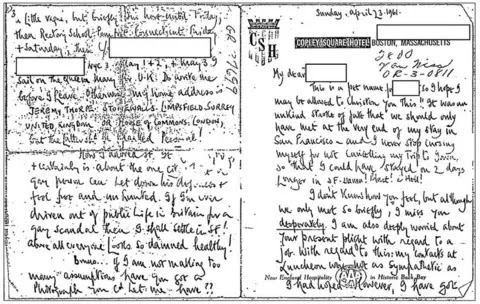 FBI
FBI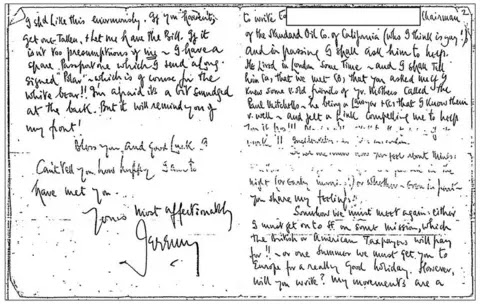
Mr Thorpe, a former leader of the Liberal party, and three others were acquitted of conspiring to murder his former lover, Norman Scott, in one of the most famous court cases in British political history.
The trial arose from a bizarre incident on Exmoor in which Mr Scott's dog Rinka had been shot dead.
The prosecution asserted that the real plan had been to kill Mr Scott himself, whom Mr Thorpe wanted to silence because he was telling others about their past relationship, a relationship which the former Liberal leader persistently denied.
During the court case, many observers were stunned when Mr Thorpe's legal team announced he would not give any evidence in his own defence.
This meant that he avoided being cross-examined by the prosecution and personally having to respond to a range of uncomfortable topics.
They included evidence of mysterious financial transactions and remarks he had made about wanting Mr Scott dead, which were part of the alleged conspiracy; but also evidence of his affairs at a time when, until 1967, male homosexuality had been illegal.
Prosecution lawyers had notified Mr Thorpe's barrister George Carman and solicitor Sir David Napley that they had significant information on his other gay relationships, including the missive to Bruno.
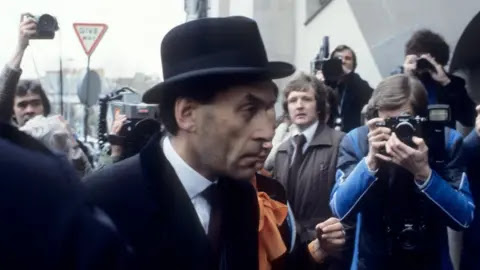
According to the biography of Mr Carman, written by his son Dominic, the barrister was already inclined to think that Mr Thorpe should not give evidence and the Bruno document "removed any doubt" he had that it was the right decision.
The significance of the letter is confirmed in an earlier book on the Thorpe affair, Rinkagate, in which the journalists Simon Freeman and Barrie Penrose state: "Any lingering doubts that Carman and Napley might have had were removed when the prosecution showed them a sexually explicit letter from Thorpe to a friend called Bruno... Carman and Napley agreed it would be a catastrophe for Thorpe if the letter became public, which would definitely happen if he gave evidence."
The decision not to go into the witness box was Mr Thorpe's legal right.
The reason he later gave in his own memoirs was that giving evidence "would have prolonged the trial unnecessarily for at least another 10 to 14 days".
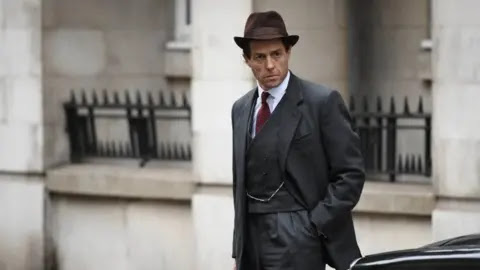
After the not-guilty verdict, it was widely considered to have been a clever strategy from his legal team.
The three key prosecution witnesses all faced significant doubts over their credibility, and they failed to convince the jury.
However, in public relations terms it was much less successful.
Mr Thorpe's acquittal did not seem to clear him in the court of public opinion.
His reputation never recovered from the allegations in the case and the widespread feeling they had not been satisfactorily answered, until he died in 2014.
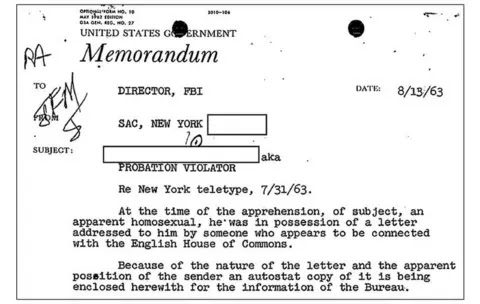
Interest in the trial has recently been reawakened by the forthcoming BBC One series, A Very English Scandal, which dramatises the events of the Thorpe-Scott affair and the ramifications of their falling out.
The FBI found the letter in Bruno's possession when they arrested him in 1963 for breaking a probation order he had earlier received for theft.
As it indicated the writer was a British member of parliament, the document was passed to the authorities in London, although the FBI's files show they mistakenly thought Mr Thorpe was a Labour rather than a Liberal MP.
The US Attorney General, Robert Kennedy, brother of the then president, wanted personally to inform someone whose name is redacted from the FBI's release but given the context, was probably in the UK government.
According to the FBI records, Mr Kennedy said: "The British can't afford another disclosure of this kind."

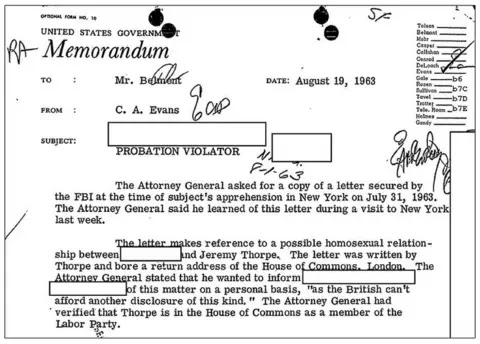 FBI
FBIThis was presumably a reference to the Profumo and Vassall sex scandals which had shaken the British establishment at that time.
War Secretary John Profumo resigned after the disclosure of his affair with Christine Keeler, a young model also involved with a Russian spy.
British diplomat John Vassall was caught after years of passing secrets to the Russians, having been blackmailed by the KGB because of his then illegal homosexuality.
In due course the Thorpe scandal was to become equally sensational.
- You can follow Martin Rosenbaum on Twitter as @rosenbaum6
Obituary: Jeremy Thorpe
In quotes: Tributes to Jeremy Thorpe
Thorpe: An establishment cover-up?
40 years on, what does Norman Scott's life look like post the Jeremy Thorpe affair?
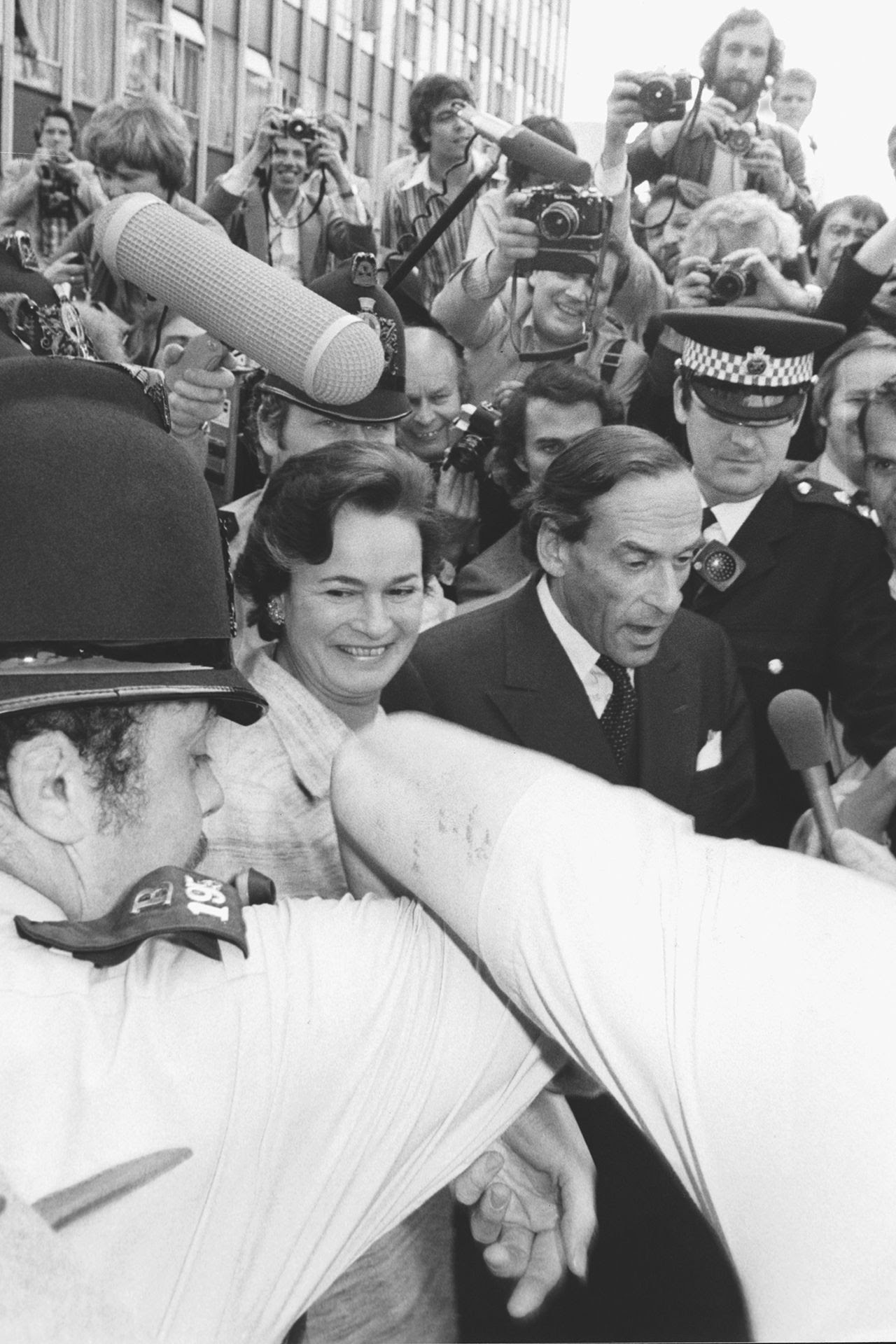
Norman Scott lives in one of Dartmoor’s most perfectly preserved longhouses, complete with an 11th-century fertility symbol and a medieval muck-pit that’s Grade II listed. Animals abound – acquaintances bought their dogs from him – and Scott is so embedded in Devon affairs that he’s even acted as judge of the Supreme Horse category of the local Chagford Show.
It’s a far cry from Court No 1 at the Old Bailey where, in May 1979, he was a key prosecution witness in a case in which Jeremy Thorpe, former MP, privy counsellor and leader of the Liberal Party, was charged with conspiracy and incitement to murder – specifically, the murder of Scott, his one-time lover.
The attempt on Scott’s life took place on Exmoor, in 1975, when a louche airline pilot and hired assassin, Andrew ‘Gino’ Newton, shot to death Scott’s beloved Great Dane, Rinka, and only failed to kill Scott when his gun jammed. A torrid tale of lust, lies and encouragements to kill led inexorably to Thorpe and others. But in court, a brilliant barrister tore one crucial witness to shreds, while a compliant judge called Scott ‘a hysterical, warped personality… He is a crook. He is a fraud. He is a sponger. He is a whiner. He is a parasite.’
WATCH
Ella Richards Takes On The Ultimate British Quiz
It was the first time a British politician had been tried for murder; Thorpe was acquitted. At the bar of public opinion, though, he was judged guilty. His reputation was forever tarnished, his political career over. And Scott? Well, in 2018 the BBC screened Stephen Frears’s three-part series, A Very English Scandal, about the Thorpe saga, and Ben Whishaw, who played Scott, won a Golden Globe, an Emmy, a Bafta and a Critics Choice Award for his performance. Whishaw called Scott ‘a true queer hero and icon’, a man with a ‘lightness of spirit, an impish, naughty quality…who took on the Establishment with a courage and defiance I find completely inspiring’.
Former male model Norman Scott out walking with his dogs, UK, 19th January 1979. He accused Liberal Party leader Jeremy Thorpe and others of conspiring to murder him.
Robin Jones/Evening Standard/Hulton Archive/Getty ImagesScott, unsurprisingly, was ‘touched’ by Whishaw’s words, and is now publishing a memoir, An Accidental Icon, cajoled from him by the team that produced Anne Glenconner’s best-selling Lady in Waiting.
His day has come. Where once, according to one source, you could sense people drawing away from Scott, he is now something of a national treasure, although he can still be difficult: ‘I’m loath to put any part of my anatomy near to that hornet’s nest again,’ said one who’s crossed swords with Scott. But his Dartmoor house is his for life, bought for him by sympathetic friends in 1985; in it is the multitude of Staffordshire china dogs he has bought over the years, and the throne-like chair given to him by Violet Trefusis, Vita Sackville-West’s lover. It is a comfortable berth in which at length to find some sense of vindication.
After the Old Bailey trial, Scott believed, with some justification, that he had been the victim of an Establishment stitch-up; on the other hand, his tormentor, Thorpe, had suffered a fatal blow to his reputation. So Scott retired from public view, living quietly. Now the spotlight is on him once again. When Thorpe first saw the 19-year-old Scott, leaning over a stable door in Oxfordshire in 1960, he thought the tall, dark-haired youth was ‘simply heaven’. But those were different times. Male homosexuality was illegal; men could, and did, go to jail because of it. No MP was ‘out’; to admit to being a homosexual was to ruin one’s career. The then 31-year-old Thorpe was MP for North Devon and a rising star in his party; the dashing, extroverted Old Etonian was also, he told a colleague, 80 per cent gay and 20 per cent heterosexual; Scott was troubled, ‘fey’, confused as to his sexuality and working at a riding school for a faintly louche friend of Thorpe’s. Thorpe gave Scott his card, embossed with parliament’s crest; Scott should come and see him, he said, if his employer ever gave him any trouble.
It was the beginning of a relationship that dominated both men’s lives for years to come. The tempestuous nature of their affair – and of the increasingly baroque lengths to which Thorpe went to silence Scott – is brilliantly and often very funnily told in John Preston’s book, also called A Very English Scandal – on which Frears’s series was based. Scott, though, has mixed feelings about the drama. Initially, he seemed to approve (‘He loved it and was very moved by it,’ said script writer Russell T Davies when he gave Scott a preview), but he soon seemed to change his mind: ‘I’m portrayed as this poor, mincing, little gay person. It’s ridiculous. I also come across as a weakling and I’ve never been a weakling,’ he told a reporter after the series had aired.
Once, Norman Scott was compared in journals like The New Statesman to the sort of pub bore who will, like the Ancient Mariner, buttonhole a stranger and pour forth, yet again, his unbelievable tale of wickedness in high places. But Scott was telling the truth, however awkward a customer he might be: he was plotted against by politicians, maligned by homophobic lawyers, ignored by policemen and personally attacked – he even had his cats killed and laid on his doorstep the night before he gave evidence against Newton. He, and Thorpe, were at the centre of a scandal that rocked Westminster. So he hasn’t given up. The Establishment was looking after its own – and Scott has weathered a long history of being treated as a worm. ‘Some people cannot understand why I seek justice for what happened after all these years, but seeking the truth should not be dependent on the passage of time and I will continue to fight for it,’ he said to reporters in 2019.
To be in the centre of a fiery political scandal is a very bruising, destructive thing; a very understandable response as its immediate heat dies down is to lie low – another victim, Christine Keeler, after being hounded and maligned over the Profumo affair, famously became a recluse. As to some degree did Scott, when he retreated from view. But 43 years after the trial that shocked a nation, Scott is back: and his book is heralded as one of the most exciting titles to be published this year. What secrets will it yield? Compared to murder in high places, Boris Johnson’s Partygate fiasco descends into nothingness.
This article originally appeared in the May issue of Tatler, on newsstands now.
Jeremy Thorpe’s resignation and its aftermath
Wednesday 11 May 2016 | Andrew Holt | Records and research |
On 10 May 1976, Jeremy Thorpe resigned as leader of the Liberal Party. Despite helping to revitalise the Liberals, his decision to step down did not come as a shock. Thorpe had for some time been dogged by rumours surrounding his personal life. By the time of his resignation, he was facing allegations of engaging in ‘homosexual acts’ – before they were decriminalised by the Sexual Offences Act 1967 – and involvement in a plot to murder his alleged former lover. The scandal was yet to reach its height, however, and Thorpe continued as Liberal spokesman on foreign affairs under his eventual successor, David Steel.
Jeremy Thorpe was born in London in April 1929. His father, John, had been a Conservative MP, as had his maternal grandfather, Sir John Norton-Griffiths, or ‘Empire Jack’. After wartime evacuation to the United States, Jeremy was educated at Eton and then Trinity College, Oxford. Here the charismatic Thorpe became head of the Liberal Club, the Law Society and finally the Union. After practising law and working to reduce the Conservative majority in his adopted North Devon seat, he was narrowly elected to Parliament in 1959 at the age of 30.
Thorpe’s election as Liberal leader came in January 1967. His leadership did not begin well, and the 1970 election saw the Liberals return just six MPs, down from 12 in 1966. Just weeks later, personal tragedy struck when Thorpe’s wife Caroline was killed in a car crash.
Britain was in the midst of industrial disputes when Conservative prime minister Edward Heath called the next general election. The February 1974 poll saw the Liberals nearly treble their vote, but the nature of the electoral system saw this translate to just 14 seats. The result was a hung parliament. Labour became the largest party. Facing the end of his premiership, Heath offered Thorpe a senior Cabinet post in exchange for Liberal support of the government. Thorpe, however, was unwilling to agree to a coalition without electoral reform, and Heath resigned as prime minister.
The scandal surrounding Thorpe originated in the early 1960s. He met Norman Josiffe, later known as Norman Scott, a stable boy and part-time model, and the two men established a relationship. The exact nature of this is contested. According to Scott’s account, it was sexual at a time when ‘homosexual acts’ were still illegal in the UK. Despite receiving assistance from Thorpe, Scott was convinced that he had been wronged. He subsequently sought ways to publicise the relationship.
Becoming increasingly concerned, Thorpe eventually confided in fellow Liberal MP Peter Bessell and allegedly came up with various schemes to rid himself of Scott for good. One plan supposedly involved luring Scott to the Florida Everglades, murdering him, and feeding his body to alligators. 1
More concrete plans against Scott allegedly began to form in the aftermath of the February 1974 election, and culminated in October 1975. Masquerading as a friend, Andrew Newton, a former pilot, drove Scott and his Great Dane, Rinka, out to Exmoor. He stopped the car and all three exited the vehicle. Newton, who was scared of dogs, panicked and shot Rinka in the head. The gun then jammed. Scott survived and his allegations finally became public during his trial for social security fraud early the following year.
The political impact of the scandal was far-reaching. Prime minister Harold Wilson had become increasingly suspicious of South Africa, which was the subject of international censure due to its government’s policy of apartheid. During a House of Commons exchange regarding the United Nations on 9 March 1976, Wilson stated that:
‘I have no doubt at all that there is strong South African participation in recent activities relating to the right hon. Gentleman the Leader of the Liberal Party’.
He did add, however, that there was no evidence that this extended to the South African government. Wilson’s suspicions led to the commissioning of a report by the Intelligence Coordinator in the Cabinet Office, Sir Leonard Hooper. This concluded that:
‘there is no evidence to suggest that the story has been concocted … as part of a deliberate SAIS [South African Intelligence Services] attempt to discredit the leader of the Liberal Party’ (PREM 11/2236).
According to Wilson’s principal private secretary, the prime minister was ‘convinced that Scott was being used by the South African State Security Organisation’ as a means to ‘destroy political leaders in this country’ (PREM 11/2237). Wilson’s personal interest in the affair also led him to acquire a copy of Scott’s social security file (PREM 11/2236).
As late as May 1978 the director of public prosecutions (DPP) still doubted whether there was sufficient evidence to bring charges against Thorpe. On 26 July, however, the attorney general informed James Callaghan, who had succeeded Wilson as prime minister in April 1976, that the DPP was likely to bring charges against four people for conspiracy to murder Norman Scott. The men were formally charged on 3 August. Meanwhile, there was some concern within Downing Street at media suggestions that the Liberal Party was seeking to have the trial postponed until after the election in order to avoid further damage to their prospects (PREM 11/2238).
The trial of Jeremy Thorpe and three others for conspiracy to murder Scott began at the Old Bailey on 8 May 1979. Bessell testified against Thorpe in exchange for immunity from prosecution, while Thorpe decided not to give evidence in his own defence. After six weeks, the four accused were found not guilty. Director of Public Prosecutions files on the case (DPP 2/6542–6571) remain closed until 2039. Files regarding the case against Andrew Newton (DPP 2/6008–10) and a separate attempt at bribery to obtain confidential information regarding Thorpe (DPP 2/6715) are currently scheduled for release two years later.
Aspects of the trial led to increased scrutiny of the press. The nature of the arrangement between Bessell and the Sunday Telegraph effectively provided a financial incentive for a guilty verdict. The newspaper promised Bessell £50,000 for the serialisation of his memoirs, but only £25,000 for shorter articles should legal issues prevent the book from appearing. Lord (Basil) Wigoder launched a Private Member’s Bill opposing payments to witnesses that were dependent on a trial’s outcome. After debate during the second reading of the Dealings with Witnesses Bill on 16 July 1979, the proposed legislation was withdrawn. The Press Council eventually reprimanded the Sunday Telegraph in October (HO 342/215).
The 1979 general election took place just five days before the trial got underway. Jeremy Thorpe stood once again for his North Devon constituency. He lost just 5,000 votes, but this was enough to hand victory to the Conservative candidate. He did at least finish ahead of his long-time antagonist, the journalist Auberon Waugh, who received 79 votes for the Dog Lovers’ Party.
The result was to mark the end of Thorpe’s political career. Keen to ensure that no further negative publicity was brought to bear upon the party, David Steel fought against those who wanted pursue their former leader for £10,000 of party funds that had been used in dealings with Scott. ‘I, in turn’, Steel wrote in a Guardian obituary for Thorpe, ‘promised that Thorpe would play no further part in the public life of the party’. He died in December 2014 after a long battle with Parkinson’s Disease.
The True Story of 'A Very English Scandal' and the Trials of a Closeted Gay Politician | Smithsonian
The True Story of ‘A Very English Scandal’ and the Trials of a Closeted Gay Politician
The new series about 1970s British MP Jeremy Thorpe traces his rise to power, then dramatic fall, complete with charges of a conspiracy to murder
Even in their wildest dreams, the British tabloids couldn’t have imagined such a salacious story dropping into their laps. It was January 1976, and Jeremy Thorpe, British MP (Member of Parliament) and leader of the Liberal Party, had been charged with conspiracy and incitement to murder. His supposed target was aspiring model Norman Scott, who claimed to have been Thorpe’s lover—and Scott’s dog, a Great Dane named Rinka, already shot to death by hitman Andrew Newton in what appeared to be a bungled assassination.
The story of Thorpe’s career in politics, his relationship with Scott, and the alleged assassination attempt is told in the BBC’s “A Very English Scandal.” Starring Hugh Grant as Thorpe and Ben Whishaw as Scott, the three-part miniseries will premiere in the U.S. on June 29, on Amazon. For Grant, playing Thorpe offered some insight into the fear the politician must have experienced.
“He was a star and everyone thought he was extraordinary. And permanently nagging at him was this possibility of exposure of his secret,” Grant told NPR. “To feel the net of the law closing in on him slowly—the stress must have been absolutely unendurable.”
But of course, in reality, fear of exposure came long before Thorpe’s run-in with the law. To be gay in Britain during that era meant putting oneself in constant danger of arrest. “It was a very oppressive climate right up to and including the Margaret Thatcher years,” says political scientist David Rayside, the author of On the Fringe: Gays and Lesbians in Politics. “In the 1970s and 80s, the overwhelming majority in Britain thought homosexual activity was morally wrong.”
Like many countries, Britain had a long history of anti-gay discrimination. The Buggery Act, passed in 1533, made sodomy a capital offense; it wasn’t repealed until 1861. Even then, it was followed by draconian measures to prevent gay relationships, including the Criminal Law Amendment Act of 1885, which made “gross indecency” between men—a purposely vague term—a criminal act. The panic over homosexuality continued after World War II, writes historian Michael Bloch in Closet Queens: Some 20th Century British Politicians: “A fiercely homophobic Home Secretary, Sir David Maxwell Fyfe, aided by an equally puritanical Director of Public Prosecutions, Sir Theobold Matthew, was determined to ‘rid England of this plague.’”
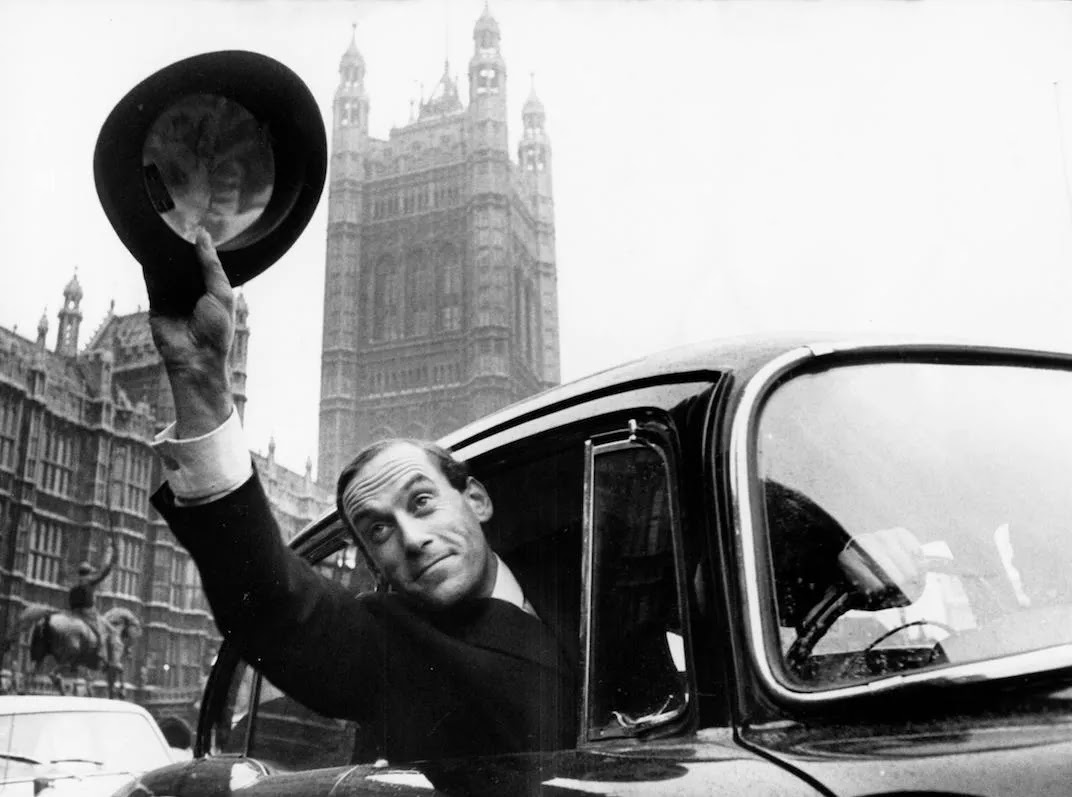
Some forward progress was made in the 1960s, especially as grassroots activism took hold within the LGBTQ community. In 1957, a government commission published the Wolfenden Report, making recommendations for laws on sexual behavior. That report recommended public statutes should avoid legislating morality, and that the government should remove consensual homosexual liaisons from criminal law. Within a decade, those goals were achieved. The 1967 Sexual Offenses Act decriminalized homosexual acts between consenting adults in private, though it didn’t remove the stigma attendant on such acts. In some ways, gay individuals were just as vulnerable as before.
“The police were still entirely willing to heavily police those venues where it was thought that homosexual activity occurred. There were many, many arrests every year,” Rayside says. As for a politician being outed, that usually meant the end of one’s political career.
That’s not to say all politicians fought actively against gay rights. The Liberal Party in particular (to which Thorpe belonged) supported continued changes to the laws. But the two dominant parties of the era, the Labour and Conservative parties, were nowhere near as interested in aligning themselves with the gay rights movement.
“Labour as a whole was very uncomfortable associating itself with what it continued to interpret as a bourgeois and dangerous issue,” writes historian Lucy Robinson in Gay Men and the Left in Post-War Britain. Labour Party MP Richard Crossman wrote of the 1967 Sexual Offenses Act, “Certainly working-class people in the north jeer at their members at the weekend and ask them why they’re looking after the buggers at Westminster instead of looking after the unemployed at home.”
Those class tensions were a major component of the homosexuality issue in Britain. Just consider another popular historical series, “Downton Abbey.” In one episode, Lord Grantham excuses the homosexual behavior of his footman, Thomas, saying such incidents happened regular when Lord Grantham attended Eton, a private school. Regardless of how historically accurate the earl’s reaction to his servant’s behavior was, it is true that gay experimentation flourished in upper-class, sex-segregated milieus like boarding school, the military, and the clergy.
“Thorpe embodied that kind of upper-class arrogance that you could get away with things,” Rayside says. “He just assumed it because he belonged to that political class.”
And whatever other politicians may have thought of Thorpe’s behavior, it had little impact on his career for as long as his dalliances remained out of the public eye. Indeed, Thorpe seems to have been remarkably blasé about his sexuality. Although he married twice and fathered a son, he also wrote compromising letters to lovers on House of Commons paper, including a note to a friend at the time of Princess Margaret’s wedding: “What a pity about [Her Royal Highness]. I rather hoped to marry the one and seduce the other.”
But the affair Thorpe could never outrun was the one he conducted with Scott, beginning in 1961. Although Thorpe maintained for the rest of his life that the relationship was only an emotional one, Scott insisted it was sexual—and used it to blackmail Thorpe. With the help of the Liberal Party, Thorpe paid Scott to help with his divorce, when he was on trial for social security fraud, and at other points throughout the ’60s. “Almost every senior Liberal MP and party official either knew about Scott or was actively involved in attempts to shut him up,” writes journalist Douglas Murray in The Spectator.
As the Liberal Party grew in size throughout the early 1970s, the pressure for Thorpe to remain in control of the situation only grew. After all, he was a charismatic politician, “the life and soul of the party” writes Liberal politician Richard Lamb. Thorpe opposed apartheid in South Africa and minority rule in Rhodesia (modern-day Zimbabwe). He helped establish Amnesty International and collaborated with other politicians to pass legislation that brought Britain into the European Common Market. Thorpe’s friends and colleagues would do almost anything to help keep him in power—including, perhaps, hire a hitman to kill the person threatening to tank Thorpe’s career.
By the time of the court trial in 1979, Thorpe had long resigned from his position and been replaced by David Steele as Liberal Party leader. Although Scott and the hitman, Newton, testified against Thorpe and several of his co-conspirators, the judge ultimately ruled in Thorpe’s favor. Newton was jailed for two years for killing Scott’s dog, and the judge deemed Scott to be “a neurotic, spineless creature, addicted to hysteria and self-advertisement.” But even though Thorpe avoided prison, his reputation never recovered and he faded from the public limelight. His exposure slowed the progress of the LGBTQ movement; it wasn’t until 1984 that British politician Chris Smith became the first to come out as gay.
For Rayside, the tragicomedy has remained a popular story precisely because of its unbelievable elements. But he thinks there’s also a real note of fear behind the mockery. “Thorpe was a prominent political figure. For this to come that close to the centers of political power and political legitimacy was new. In other cases where politicians were getting close to being exposed, they would simply resign.”
But Thorpe, risktaker that he was, refused to give in. He fought to the last, leaving behind a turbulent—and still unresolved—legacy.
Lorraine BoissoneaultREAD MORE
Lorraine Boissoneault is a contributing writer to SmithsonianMag.com covering history and archaeology. She has previously written for The Atlantic, Salon, Nautilus and others. She is also the author of The Last Voyageurs: Retracing La Salle's Journey Across America. Website: http://www.
Norman Scott role in Jeremy Thorpe BBC drama 'very unkind'
Norman Scott role in Jeremy Thorpe BBC drama 'very unkind'

A man at the centre of the Jeremy Thorpe scandal has described the depiction of him in a TV drama as "very unkind" and a "caricature".
The three-part, 2018 BBC series A Very English Scandal explored Norman Scott's alleged affair with late former Liberal Party leader Mr Thorpe.
The North Devon MP was acquitted at a trial in 1979 of being involved in an alleged attempt to murder Mr Scott.
The series' writer, producers and actor Ben Whishaw have been asked to comment.
Speaking on a podcast, British Scandal: Jeremy Thorpe, Mr Scott, 83, who lives on Dartmoor in Devon, said he was "very cross" with his portrayal by Whishaw.

He said: "Ben was being a very good actor, he had met me, he knew me, and I hoped that he would be me...
"I think it was very - I can say it because it's what I believe - it was a black comedy. It was very unkind. But Ben played me very well."
Reflecting on scenes from the series, which starred Hugh Grant as Thorpe, he added: "But I did not walk down the stairs of the Old Bailey saying that I am gay and queer and all this sort of thing. Because it's just not me. I'm not that sort of person.
"I scuttled away after I had given my evidence and went back down to Devon. I wasn't there to do that. It was unkind, really. I was a caricature."
The series was based on the book of the same name by author and newspaper arts editor John Preston.

At the time of production, Mr Whishaw said he felt a "connection" to Mr Scott and wanted to "do him justice in his complexity and in his variety as a human being".
After entering Parliament in 1959 as a member of the Liberals, Mr Thorpe went on to head the party in the 1960s and 1970s.
Mr Scott claimed they had a relationship at a time when homosexuality was illegal - it was legalised between men in 1967 - and an attempt on his life was made on Exmoor in 1975.
Mr Thorpe denied the fling and was acquitted of conspiracy and incitement to murder Mr Scott.
But, following the case, aged 50 and having lost his seat in the Commons in 1979, he withdrew from public life.
He died from Parkinson's disease in 2014, aged 85.

Follow BBC News South West on Twitter, Facebook and Insta
Jeremy Thorpe: a very Welsh scandal?
Jeremy Thorpe police inquiry probed
In quotes: Tributes to Jeremy Thorpe





